













By Jillian Parks, Isaac Green, and Moira Gleason Editor-In-Chief, Managing Editor, and News Editor
Former president Donald Trump won his second presidential election Tuesday with at least 295 electoral votes, defeating Vice President Kamala Harris, the Democratic nominee.
“I am glad of the result, more
glad that it seems to reflect something Lincoln described: ‘A majority, held in restraint by constitutional checks and limitations, and always changing easily with deliberate changes of popular opinions and sentiments, is the only true sovereign of a free people,’” College
President Larry Arnn told The Collegian in an email. “I think that’s true and am happy that it
seems still to prevail. The winning party won narrowly and broadly. The people can change their minds if it pleases them.”
Republicans also took control of the U.S. Senate after flipping seats in Montana, Ohio, and West Virginia, giving them at least 52 seats in the chamber and the possibility of as many as three more, depending on final results in Arizona, Neva-
By Thomas McKenna City News Editor
Mayor Adam Stockford will resign Jan. 1 after he announced at Monday’s city council meeting that he will no longer reside within city limits next year.
The mayor’s term is set to expire in 2026, but Stockford said he and his wife closed on a house outside of the city last week.
“There’s no hidden message. There’s no conspiracy.
There’s no monkey business going on,” Stockford told The Collegian. “It’s a choice I made with my wife, and we’re willingly walking out the door.”
The Hillsdale County native has been the city’s mayor for the past seven years, and his departure will begin a new era of city politics.
Who the next mayor will be is unclear, as Ward 4 Councilman Joshua Paladino told The Collegian he will consider proposing a challenger to the heir apparent, Ward 2 Councilman
and Mayor Pro Tem Will Morrissey.
As the new city council term begins, the nine-member body will elect a mayor pro tem at its next meeting, Nov. 18, after new members Jacob Bruns and Bob Flynn are sworn in Nov. 12. When Stockford resigns in January, the mayor pro tem will serve as the acting mayor until a new mayor is elected.
See Mayor A6
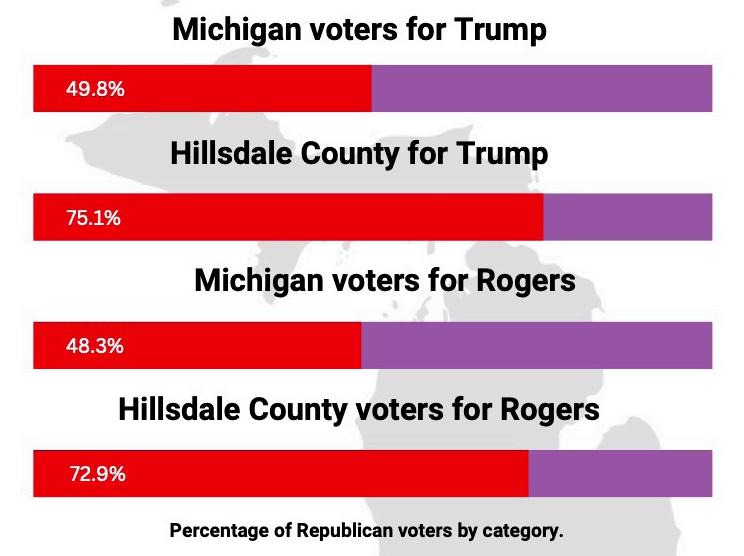
da, and Pennsylvania. The House of Representatives is still up for grabs, as Republicans won at least 206 of the 218 seats needed for a majority, with 38 races undecided as of Wednesday night.
“I kind of got sucked back into watching the news the last few days, getting my hopes up, and I felt like at some point last night, Lucy was gonna pull the football away, I would be Charlie Brown, and I would be disappointed,” Professor of Biology Anthony Swinehart said. “But obviously, as a conservative, I was happy with the outcome.”
Victories in the battleground states of Georgia, North Carolina, Pennsylvania, and Wisconsin pushed the president-elect over the edge in the early morning hours Wednesday. With the later addition of Michigan, only the outcomes in Arizona and Nevada remain unknown, according to the Associated Press.
Trump won about 51% of the popular vote, having captured more than 72 million votes at press time. Harris had fewer than 68 million votes.
“I think the ‘red wave’ we saw across all of the swing states, the Senate, U.S. House, and the Michigan state House show that Americans are dissatisfied with the policies of the Democratic Party and look for strong leaders in Washington that will fight for the people,” said junior Hin-
son Peed, president of Hillsdale College Republicans.
Fox News projected Trump’s victory as early as 2 a.m. on Nov. 6, but most outlets waited until shortly after 5:30 a.m. to make the call.
“I thought it would be really close, we would be waiting weeks to find out, there would be monkeying around with the returns,” said Paul Moreno, professor of history. “I didn’t expect the clear landslide that we ended up with. So I was just astonished as usual.”
Trump will become only the second president to serve two nonconsecutive terms, following the example of Grover Cleveland, who won in 1884, lost in 1888, and won in 1892.
With successful abortion referenda in Arizona, Colorado, Maryland, Missouri, Montana, Nevada, and New York and a chance to win a majority of seats in the House, Democrats should not be overly negative about what happened on election night, especially looking forward to 2026, according to Associate Professor of Politics
Joseph Postell.
“I can see it being within the realm of possibility for them to take both the Senate and the House,” Postell said. “That tends to happen in these first midterm elections.”
Senior Kelsey Griswold-Bacigalupi, president of Hillsdale College Democrats, said Trump has redefined modern American conservatism,
and is interested to see how the country will look in four years.
“America will be drastically changed at the end of Trump’s second term,” Griswold-Bacigalupi told The Collegian in an email. “Whether for the better or the worse, it will be declared along party lines. My sights will be on the steps the Republican Party takes in determining what a post-Trump candidate would look like.”
In 2016, Trump won 306 electoral votes, compared to 232 for Democratic candidate Hillary Clinton, who carried the popular vote. In congressional elections two years later, Republicans gained seats in the Senate but lost control of the House of Representatives. In 2020, Democrat Joe Biden defeated Trump, 306 electoral votes to 232.
Some Hillsdale College faculty are not excited about Trump’s win. According to a voluntary survey conducted by The Collegian, 36 of the 93 faculty and staff respondents reported voting for Harris, other, or remaining undecided.
“I voted for Harris. I’m very disappointed that Trump won, but I’m glad for the clarity of the result,” said Peter Blum, professor of sociology. “My deepest hope is that those who refuse to identify Christianity with a political party or a nation will continue to find and raise their voices.”
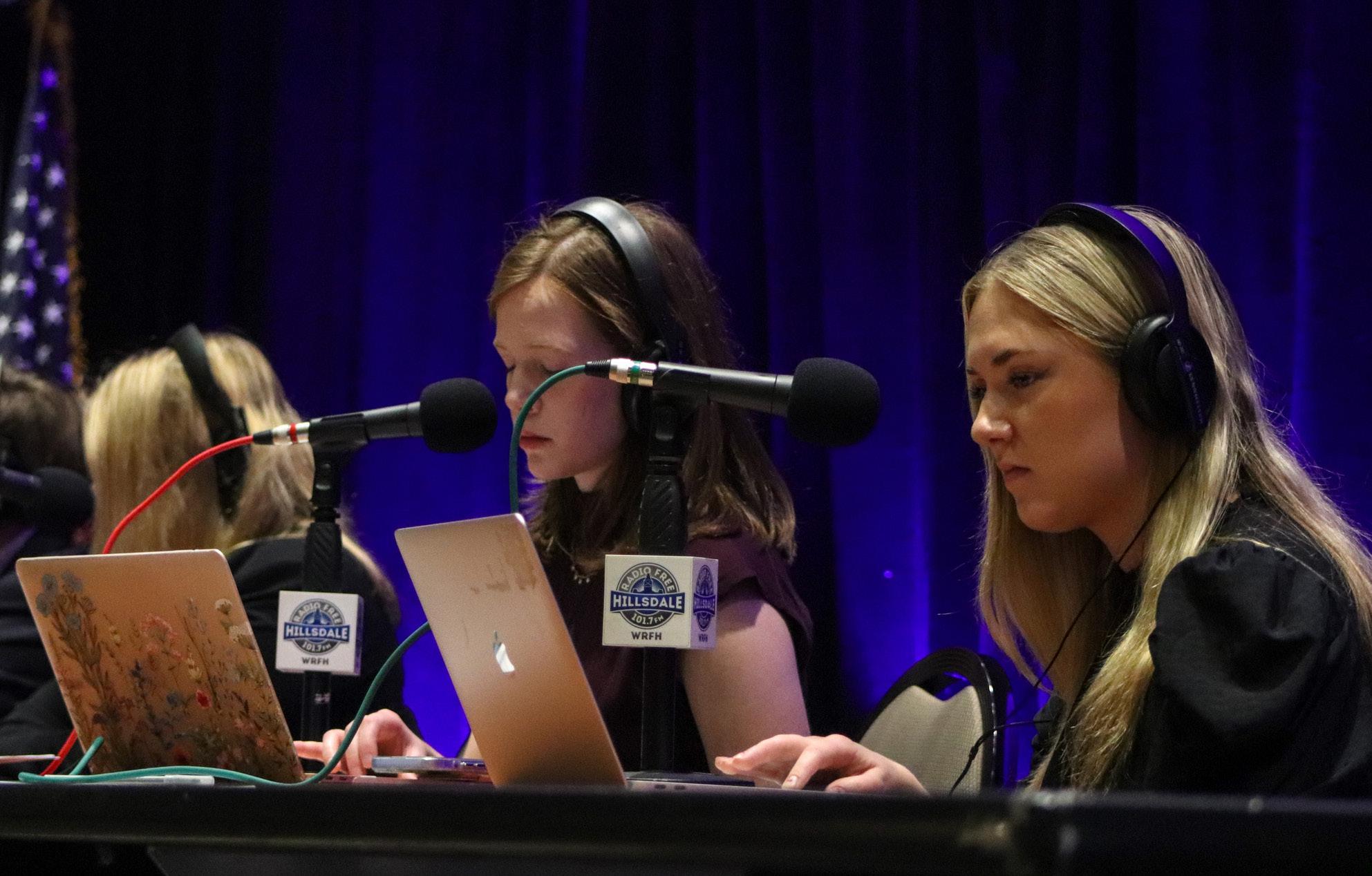
By Olivia Pero Outreach Director
Every time a state turned
red, attendees in the Searle Center erupted into applause as radio students live-broadcasted election results on Radio Free Hillsdale 101.7 FM.
Students interviewed guests by phone and in person, including White House Correspondent for The Daily Caller Reagan Reese ’22, Republican Jennifer Wortz, who was elected the 35th District State House Representative, and Associate Professor of Politics Joseph Postell. The Searle Center election coverage concluded before
the presidential race results were officially announced.
Students attending the event shared mixed feelings about the direction of the election throughout the evening.
Junior Hinson Peed, president of Hillsdale College Republicans, said he thinks Radio Free Hillsdale’s event in Searle Center was amazing.
“You don’t see this at most colleges. We have such great guests, analysts, and anchors. It’s really a great event,” Peed said.
Sophomore Julia Rentmeester said she enjoyed the event a lot.
Freshman Kathryn Vieceli said she thought former President Donald Trump would win the presidential race because he had 23 electoral votes around 8 p.m. while Kamala only had three.
“I know it’s only in a couple states, but already in West Virginia one of the seats in the Senate has flipped to Republican, and that’s absolutely amazing,” Vieceli said. “We already won Kentucky, so that’s really good too.”
“I like that we’re hearing from professors, students and actual representatives about the election,” Rentmeester said. “It’s really helping me be better informed.”
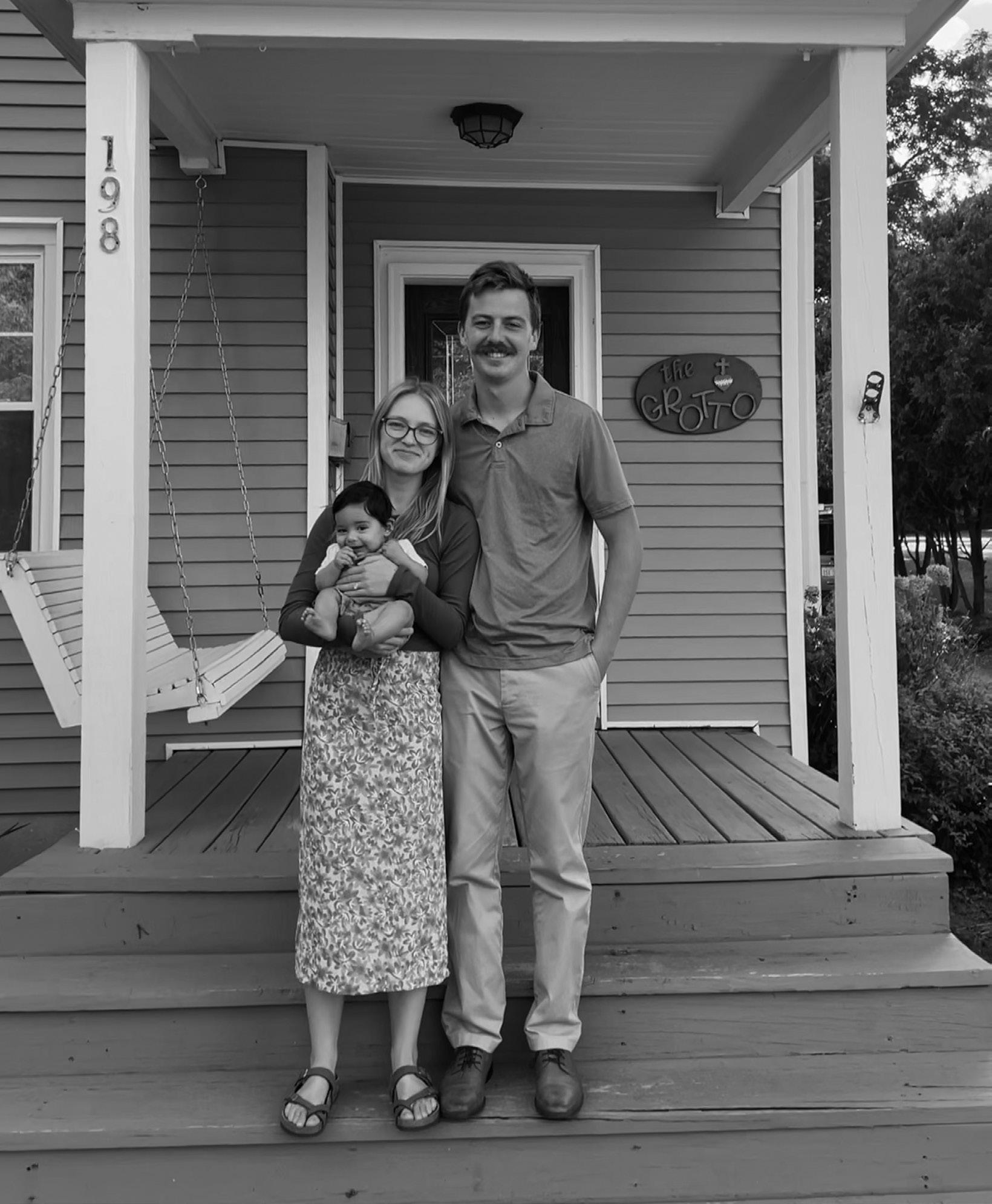
By Elaine Kutas Collegian Reporter
Hillsdale Catholic Society’s Grotto family has announced that this school year will be their last year running the Grotto ministry under the direction of St. Anthony of Padua Catholic Parish.
Ben ’22 and Shelby ’22 Hufford, who are now parents to their baby, David, took over the Grotto in 2021 as seniors.
“It’s been great getting to befriend so many amazing Catholic students,” Ben Hufford said. “Living with a chapel that houses Our Lord in the Eucharist has been a blessing through the highs and lows of the past couple of years.”
The home, called the Grotto, is an off-campus house on Union Street designed for Hillsdale students to spend time in the Eucharistic adoration chapel, engage in Catholic Society events, and socialize with other Catholic students. The Grotto is an outreach ministry of St. Anthony’s Catholic parish that aims to bring the Eucharist on campus and closer to the students.
“The Grotto has been a home away from home; it’s been a place where I can recalibrate and connect with
Freshman Ashlyn Unangst said she is the type of person who expects the worst, so she said Vice President Kamala Harris would probably win the election.
“With more of Gen Z being able to vote, I think younger voters are more likely to lean toward Kamala, so I’m expecting that but hoping for a Trump win,” Unangst said around 8 p.m.
Senior Dominic Pizano said he voted for Trump.
“I’m very anti-abortion, so that’s my main reason for voting,” Pizano said around 9 p.m. “I think it’s going to come down to Pennsylvania. Of all the swing states, I think it’s probably the most important. I’m really unsure of what’s going to happen, but I’m leaning toward Trump.”
Sophomore Zach Briley said around 10 p.m. the race looked OK for Trump.
“Obviously that’s my dog
others while we worship Jesus Christ,” said senior Charlie Miggins, president of Hillsdale Catholic Society. “The Grotto has absolutely been a rock in my Hillsdale life.”
According to the Huffords, running the Grotto was on their mind as students, but they were unsure if it would be possible.
“We started at the Grotto our senior year because we got engaged in January of our junior year and moved up our wedding to get married in October of our senior year,” Ben said. “We had both worked in ministry, loved the Grotto, and talked about being a part of it when we entered our engagement.”
The couple who ran the ministry at the time approached the Huffords the final week before summer break, asking them to apply.
“We applied, got the position, and moved all our stuff into the Grotto the day before we left for summer after our junior year,” Ben said.
According to Shelby, students’ faith life and devotion have been a great source of inspiration during her time at the Grotto.
“When we first moved here, I was really impressed by how holy so many of the students who come to the
in the fight here,” Briley said. “I think we’ve got a couple states that are gonna be really important still. I like how Ohio is trending for the Senate, but there’s still a lot of time left in the night.”
Sophomore Mercy Franzonello said she loved the event in Searle Center. She also said she really wanted Trump to win.
“I’m feeling pretty confident, pretty hopeful, praying pretty hard,” Franzonello said. “You never know how it’s going to turn out, but I’m really hoping Trump wins.”
Peed said at around 10 p.m. he was feeling really good about the election.
“I’ll be honest, my predictions were that it would be a really tight race, but it looks like it’s possibly going to be a landslide. A lot of these swing states are turning red,” Peed said. “It does look like Republicans will take the White House, the Senate, and the House.”
Anthony’s is currently accepting applications. The requirements are few, but the desire to serve must be strong.
“The requirements are that you’re married by August, that one of you attended Hillsdale, and that you’re Catholic,” Shelby said. “We encourage anybody to reach out to us with any questions because we’re the go-to people to ask about what it’s like, the benefits, the challenges, or just daily life running the ministry.”
College
By Megan Li Assistant Editor
The college will launch the Master of Classical Education Leadership hybrid program, its first degree including online learning, in summer 2025.
ucation, who are working in classical education, you want them to continue that work.”
The impetus for the graduate school began with conversations between Coupland, Whalen, and Assistant Professor of Education David Diener.
Grotto are,” Shelby Hufford said. “It was really impressive to me, just the dedication that so many of our fellow students had to prayer that I definitely was still working on.”
According to senior Paul Sri, Catholic Society’s men’s outreach director, the Huffords have inspired students in their dedication to the community.
“It has also been beautiful to witness their transition from being newly married college seniors my freshman year to now being parents four years later, and what it looks like to progress between two stages of life,” Sri said. “I want to carry elements of what they do wherever I go after college.”
Although they are stepping down from leading the Grotto, the Huffords said they hope to stay in Hillsdale.
“We’ve learned not to make concrete plans because a lot has changed in the past couple of years, but at the moment, we plan to stay in Hillsdale,” Ben said. “We’ve found a great community here, between families with young kids and the community at St. Anthony’s.”
A new Grotto couple has not yet been chosen, but according to the Huffords, St.
Associate Professor of Philosophy Ian Church also voted for Harris and said he appreciated her words after the race was called.
“As I listen to Kamala Harris’ concession speech, I’m reminded of why I voted for her,” Church said. “Whatever policy disagreements I might have with her, at least she has the strength of character to admit she lost. Without that strength of character — sacred to our republic — I don’t think anyone is worthy of leading our great nation.”
Assistant Professor of Theology Cody Strecker expressed concern for the election’s reflection on American Christianity.
“Pope St. John Paul II always said the needs of the poor take priority over the desires of the rich,” Strecker said. “At the moment mostly what I feel is concern about what this election will mean for the poor in this country. The promised deportation of multiple millions of
The Huffords and Catholic students have high hopes for the Grotto’s future. The Grotto’s expansion project fundraising began this fall, hoping to raise $1 million to add an additional 1,500 square feet to the building, which would provide the Grotto with ample space to meet the hosting demands of the Catholic community on campus by allowing space for a larger chapel, an open floor plan for gathering space, a private apartment for the Grotto couple, and an expanded kitchen with capabilities for preparing meals for large groups of students. With fundraising for the expansion project underway, Ben said he is confident that the Grotto’s ministry will continue to serve students for years to come.
“It’s been on a very successful trajectory, so that project will continue if everything goes well,” he said. “There’s not much more the Grotto can offer without more space, so as that project continues, the Grotto will be able to continue its ministry.”
Sophomore Martha Kennedy, a member of Catholic Society, said the Grotto became a resting place when she came to campus.
“It was just what I needed for my faith life at the time,” Kennedy said. “When I moved on campus, it was nice to have a family and a home to help me grow in my faith while also transitioning to college life.”
Kennedy said she will miss the Hufford family and hopes the new couple will continue what the Huffords have been doing.
“I hope they can bring the same life that Shelby and Ben bring to the Grotto; having people who can always share Christ’s joy is definitely what students need,” Kennedy said. “I also hope they can make Convivium bread as well as Ben does.”
illegal immigrants would be a moral atrocity.”
According to Moreno, this election cycle had weak candidates all around.
“The Democrats are completely out of control. Just the insanity of what that party stands for now is beyond the common sense of ordinary Americans,” Moreno said.
Moreno said neither candidate proposed specific policies to address the biggest problems the country faces like the sovereign debt crisis and foreign policy crises in China, Russia, and Iran.
“I don’t think Trump, or much of the Republican Party, has much of a policy agenda that I can discern,” Moreno said.
Charles Steele, associate professor of economics, said Trump is the better bet from an economic standpoint.
“I don’t think there’s any question that Trump’s victory is better for economic growth because it means less regulation — hopefully a lot less regulation — and reduction of federal
The newest addition to the Diana Davis Spencer Graduate School of Classical Education, the program is focused on the practical work of classical education at the K-12 level, emphasizing leadership in the classical classroom, school, and community. The application deadline is Dec. 15.
“Leadership, broadly defined, is not solely in one position of head of school,” Graduate School Dean and Professor of Education Daniel Coupland said. “In order for a school to thrive, you need to have good leaders at every level.”
Graduate School Program Coordinator Jaime Boerema ’22 said 11 students have matriculated from the in-person, on-campus Master of Arts in Classical Education residential program.
“There will still be nuance within our students’ choices, and our students will be equipped to go into any field within the world of classical education,” Boerema said.
One of the chief challenges for charter schools is the recruitment of capable, qualified teachers, said Associate Vice President for Curriculum and Professor of English David Whalen.
“As a college committed to the intellectual and cultural patrimony of the West and of America in particular, we’re well positioned to render young men and women knowledgeable and capable of stepping into a classroom with a clear understanding of their educational purposes and the proper content of that education,” Whalen said.
The hybrid program will take three years to complete and will follow a cohort model accepting 15-20 people this year. The spring and fall semesters consist of a fully-online course. Students will engage in an online apprenticeship during the winter and study for a week on campus in the summer. According to Coupland, the college created the program for those who wanted to continue working while completing a master’s program.
“We’ve always wanted to reach out and reach people who were not necessarily able to stop their lives,” Coupland said. “If you have people who are committed to classical ed-
bureaucracy, which is a possibility,” Steele said. “If there’s any hope of getting out of our debt problem — which is really a serious problem many people recognize — then it would be a Trump victory.”
One thing the Harris campaign did make clear was its commitment to protecting abortion, which became a central issue during this election. According to Gary Wolfram, director of economics and professor of political economy, voters have realized that it is possible for them to vote for abortion measures on a state level but support Trump on a national level. Wolfram said this election proved that voters care more about immigration and election policies than national abortion measures.
Assistant Professor of Religion Don Westblade said he thinks the national reaction to the outcome has more to do with Harris losing than Trump winning.
“I think most people in this election were either voting against Harris or against
“We actually had graduates of the college who were going to work in classical schools who were coming back to us and asking, ‘where can I go to study classical education at the graduate level?’ And then there was often, as a follow up question, ‘why isn’t Hillsdale doing this?’” Coupland said. “We wanted to have a residential program on campus here in Hillsdale, because that’s what we do. We bring people together in a room and have conversations about great ideas.”
Coupland said the classical school program stands out because of its integration of rich discipline-specific content into the field of education.
“It’s not just about the process of education,” Coupland said. “But at the same time, there’s an emphasis placed on the idea of education, broadly defined, not just the study of literature, not just the study of philosophy, but all those disciplines offering a perspective on what it means to be a human being.”
Chairman of the Education Department and Associate Professor of Education Benjamin Beier said he enjoys the combination of theoretical and practical conversation about education that occurs within the graduate classroom.
“We can be, in one moment, in a very theoretical philosophical conversation, and another moment be informing that conversation with, ‘when I was teaching fifth grade,’” Beier said. Beier said his liberal education shaped him and oriented him toward what is good, true, and beautiful.
“It’s such a joy to give others a liberal education and such a joy to return to some of the really excellent books and artifacts that are nearly inexhaustible in what they have to offer us,” Beier said.
Coupland said the Hillsdale curriculum will be able to meet the great demand for quality graduate studies in classical education.
“We’ve been very, very thoughtful about this, and it’s been refined slightly over time, but we really like where it is,” Coupland said. “We know that much is expected of us, but we’re happy to accept that challenge.”
Trump, and not really so much for those candidates,” Westblade said.
For those on campus and off who were surprised by the outcome, Professor of History Darryl Hart said the press is partially to blame for the upset.
“I don’t want to just blame the press, but I do think the mainstream media deserves blame,” Hart said, “[for] not trying to think about the reasons why people might not want to vote for Democrats and might even find Trump at times appealing.”
Despite the relief many conservatives feel, there is still work to be done, according to Professor of Philosophy and Religion Nathan Schlueter.
“I feel like the good guys right after the battle of Helm’s Deep: relieved and grateful that we have just bought precious time,” Schlueter said. “But the Ring of Power has not been destroyed, and I fear there are some difficult days ahead. Time to get our boots on, as I’ve heard someone say.”
By Sophia Bryant Collegian Freelancer
Hillsdale alumna and C. S. Lewis scholar Melinda Nielsen will speak on Lewis’ “idea of the university” in Conrad Recital Hall Nov. 8, hosted by the C.S. Lewis Society.
“Dr. Nielsen has lectured to Oxford’s C.S. Lewis Society,” C.S. Lewis Society president and senior Justus Hume said. “It will be good to have someone who’s not a professor here speak to bring a fresh and new perspective.”
Nielsen, an associate professor of classical literature at Baylor University, graduated with her bachelor’s degree from Hillsdale College and completed her master’s and Ph.D. at the University of Notre Dame. She has published articles on Boethius, Lewis, and English Catholic
By Christian Papillon Collegian Reporter
Hillsdale exceeds most universities in campus security, Executive Director of Security and Emergency Management Joe Kellam said in an Insider Series presentation hosted by Hillsdale’s 1844 Society Oct. 29.
“We all must remain vigilant and prepared to ensure the safety of our campus,” Kellam said in an introductory video presented at the event.
Kellam said campus security uses layers of safeguards such as key card access, regulated hours of operation, security vehicles, and response teams.
“If something gets through a layer, it doesn’t get through all the layers,” Kellam said. “The card access has been nice for us because we have full control of all the doors on campus. We can easily go into a soft lockdown. If there’s a disturbance with somebody two blocks down the street, we push a button. Now campus is on a soft lockdown, and all of a sudden, you can’t open a door, but your card lets you in.”
Kellam said much of what security does to protect campus happens behind the scenes.
“Most of the time, you never see any disturbances and you just go about your daily lives,” Kellam said.
In addition to securing the campus, Kellam said the campus security team is first responder certified to provide medical services to students.
According to Kellam, campus security can serve as an intermediary between parties in the event of things such as noise complaints so city police do not need to get involved. Kellam said he hopes students realize that campus security is there to help them and to keep them from getting in trouble with the city police.
Sophomore and 1844 society executive board member Austin Piecuch said the lecture was in line with the goals of the Insider Series.
“We always plan our Insider Series to show sides of campus that students do not see,” Piecuch said. “Security was a good thing for that. It’s a thing that students don’t all get to learn about.”
Sophomore Avi Maljanian said he found the talk useful.
“It provided a lot of information that we wouldn’t otherwise know,” Maljanian said. “We have the luxury of ignorance because security deals with threats behind the scenes.”
theologian John Henry Newman.
“I’m interested in learning more about the connection between Lewis and Newman,” Hume said. “They shared the same stomping grounds of Oxford and England. I’m interested to see if Lewis’ philosophy of higher education will reveal his thoughts on the Oxford Movement.”
The Oxford Movement, which Newman helped lead, sought to restore Catholic beliefs and rituals to the Church of England.
“Lewis has said things that Catholics, Protestants, and Orthodox Christians can all agree with,” Hume said. “His writing and philosophy are beautiful. The C.S. Lewis Society hopes to encourage scholarly curiosity and hospitality by inviting speakers
who are familiar with Lewis.”
The society hosts two lectures every semester. After every lecture, an off-campus house hosts a soiree, giving the attendees the opportunity to meet the speaker and discuss the talk.
“In the spirit of Lewis, the soiree provides the opportunity for conversation and deepened friendships,” said sophomore and C.S. Lewis Society minister of hospitality Jianna Coppola. “Food and a welcoming environment are essential components of the soiree for us to foster great conversations.”
Coppola said she is excited for the soiree to follow Nielson’s talk, which will include caprese skewers with balsamic glaze, raspberry mousse, and pumpkin cheesecake.
According to Hume, Niel -
sen’s talk is part of a series of lectures about Lewis and education.
Hume said the Society is partnering with the education department for an upcoming talk in February.
Because many students at the college hope to be educators in the future, Hume said Lewis’ philosophy of education has practical implications for many people on campus.
“I hope students will gain a new perspective on the university and what it means to be an educator from Lewis’ philosophy of education,” Hume said. “Lewis really spoke to aspects of people’s lives. I hope Lewis’ idea of the university grounds students and gives a new perspective on education from someone who’s familiar.”
By Kathryn Vieceli Collegian Freelancer
The Student Ministry Board will host its third EvenPraise service on Nov. 10 at 6 p.m. in Christ Chapel.
EvenPraise, following the traditional liturgy of Evensong, adds intentional and contemporary supplementation to the service, senior Alex Schrauben said.
“The liturgy is the same and it stays very, very traditionally and biblically rooted,” Schrauben said.
EvenPraise expresses intentional worship differently than Evensong by incorporating contemporary praise music, hymns, and chanting into the Anthem, according to Schrauben.
Within the traditional Evensong liturgy, the Anthem is the choral climax of the service, which connects the Old Testament to the New Testament in which God fulfills his promise, Schrauben said.
According to Schrauben, the music is intentionally placed and slightly altered from the original hymn, yet it
is meditative and thoughtful.
Senior Nathan Stanish said EvenPraise expands on the ecumenical spirit of Evensong while maintaining the worship aspect between different denominations.
Schrauben and Stanish serve on the five-member Student Ministry Board, founded by College Chaplain Rev. Adam Rick last year, to unify the different denominations through worship. The group organizes an EvenPraise service each fall and spring.
Unlike weekly Evensong services, the Chapel Choir is not involved in EvenPraise. The Student Ministry Board puts on the service with its board members, volunteer students, and musicians.
In preparation for EvenPraise, the Student Ministry Board reads documents from the Second Vatican Council to respect the worship of the Catholic Church, and it analyzes the contemporary forms of music in other denominations with an extensive rubric, Stanish said.
“The biggest section of the rubric is on the theology of
the song,” Stanish said. “So it goes through questions like, ‘Does it have a clear trinitarian theology behind it? Does it make sure not to violate any serious portions of Christian doctrine?’”
Stanish said the Student Ministry Board intentionally reviews the music used for EvenPraise to prevent any miscommunication between the denominations.
“Different denominations have rigorous ideas of what worship should look like and we want to respect that,” Stanish said.
EvenPraise, much like Evensong, serves as an event where all denominations can come to worship God, according to Schruaben and Stanish.
“If we are a Christian institution, we ought to be coming together as a college and praying, regardless of different beliefs on theology,” Schruaben said. “The essential thing is that we are all in the body of Christ.”
Rahe
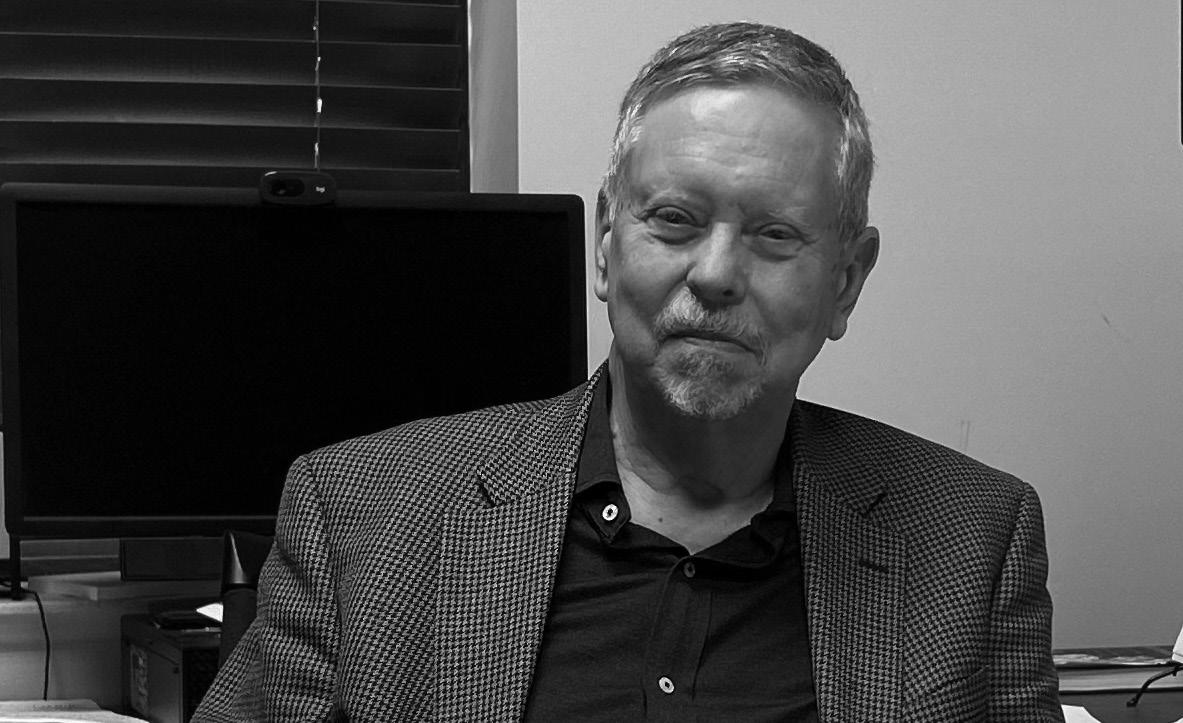
By Gemma Flores Collegian Reporter
The sixth installment in Professor of History Paul Rahe’s series on Spartan grand strategy, “Sparta’s Third Attic War: The Grand Strategy of Classical Sparta, 413-404 B.C.,” will be available for purchase Nov. 19.
The book follows the Spartans’ final struggle with the Athenians for power in the Aegean.
“By grand strategy, I mean a comprehensive strategy — not only military matters but diplomacy, economic concerns, intelligence, and even religious concerns — for defending a way of life over time,” Rahe said.
Fifteen years ago, Yale University Press approached Rahe, asking him to write a book on Spartan warfare. What was supposed to be a single book turned into six, with a seventh in the works.
“This last volume is the longest volume, which I had not expected,” Rahe said. “There’s a sort of story to tell about Athenian perseverance and courage — which is just amazing — and the interrelations between Sparta and Persia. It was quite a bit of fun to write.”
Rahe said he plans to write a seventh book chronicling the aftermath of the Spartan defeat of the Athenians to round out the series.
Senior history major Keara Gentry recently finished the unit on Spartan grand strategy in her class with Rahe.
“He’s absolutely brilliant. He knows everything. It seems like he’s read every philosopher that’s ever been published,” Gentry said. “He’s also just super generous with his time. I’ll go to his office hours and not
leave for an hour. He’ll just talk with me through questions, talk with me about life.”
Chairman and Associate Professor of History Korey Maas said he is confident in Rahe’s abilities as a historian and writer.
“Paul brings the complete package to this work on Sparta,” Maas said. “He is the unparalleled expert in the field.”
By studying Sparta’s approach to foreign affairs, Rahe said, modern leaders can see the importance of a more holistic approach to government.
“There’s a powerful tendency among political scientists and it has infected the defense intellectual establishment to think in terms of what is called realism,” Rahe said. “Realism supposes that all states want the same thing: power. It’s nonsense. They want different things.”
Rahe said he seeks to emphasize the importance of considering multiple factors when looking at foreign policy. One important factor that policy makers often overlook, according to Rahe, is religion.
“There’s nobody in the State Department — as was explained to me by someone formerly in the State Department — who takes religion seriously,” Rahe said.
Rahe said he hopes these books will serve as a guide for modern-day leaders on how to properly navigate foreign policy.
“The idea is to transform the study of foreign policy by providing an example,” Rahe said. “There are two ways to try and persuade someone: you can tell them and you can show them. In the appendix, I tell them. And in the books, I try to show them. So, it’s an elaborate act of show and tell.”
Toni Morrison scholar lectures on race, desire, revision
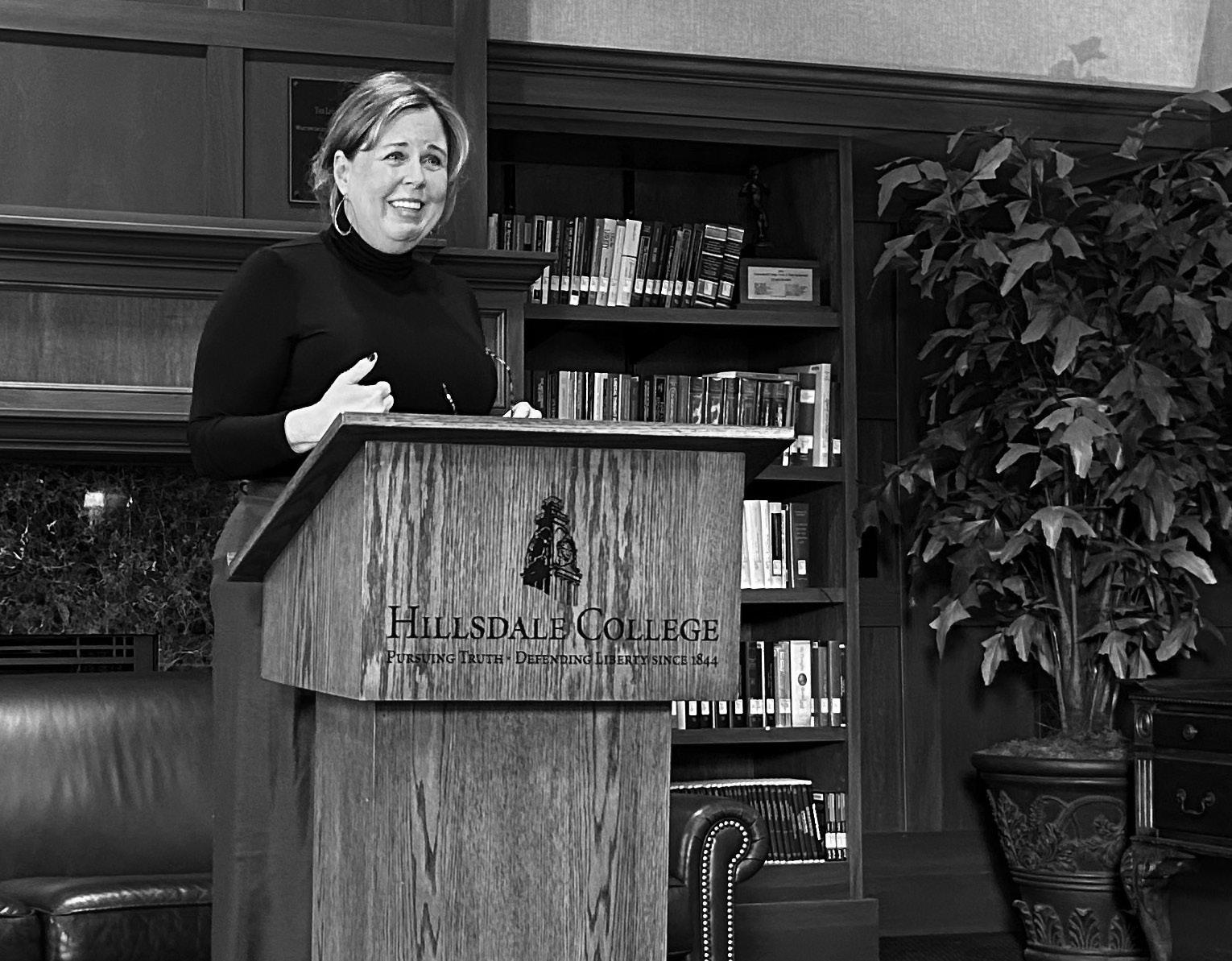
By Caroline Kurt Opinions Editor
Scholar Kathleen Marks spoke on Toni Morrison, an author her mentor called the great African-American novelist, in a lecture titled “Toni Morrison’s Trilogy: Mapping Desire Lines to the Future,” Oct. 29.
Marks is the chair and associate professor of Arts and Humanities and director of Liberal Studies at St. John’s University. Marks discussed the 1987 novel, “Beloved,” and its Ohio setting during the antebellum era. In the novel, Sethe, a formerly enslaved
mother, is haunted by the ghost of her dead daughter.
Marks said Morrison’s trilogy of “Beloved,” “Jazz,” and “Paradise” focuses on the ways love goes awry and gives haunting insights into the human condition.
“Morrison has a preoccupation with the ways in which we can harm ourselves, the ways in which we can sabotage ourselves, kill ourselves,” Marks said. “When Morrison became a literary star, her work was described as magical realism, a term she rejected, insisting that her stories were not magical, but simply real.”
Marks published “Toni Morrison’s ‘Beloved’ and the Apotropaic Imagination” in 2003. Marks said she returned to her scholarship on Morrison — an African-American author whose work largely concerned race — in the wake of the 2020 Black Lives Matter riots.
“I fear that she’s in danger of falling through the cracks,” Marks said. “Progressives want activists and not art, and conservatives are a little suspicious of her liberal views.”
Marks toyed with the urban planning concept of “desire lines,” defined by Merriam-Webster as unplanned
paths favored by pedestrians over conventional travel routes. She connected it to the ghosts, spirits, and specters in Morrison’s writing.
“Morrison’s education at Howard and Cornell exposed her to the skepticism of academia, which sought to distance itself from the primitive or spiritual aspects of storytelling,” Marks said. “She always pushed back against such limitations, following her own desire lines and insisting that the spiritual and the real could go together, could coexist in her novels.”
Morrison is currently writing a new book, “Toni Morrison’s Trilogy and the Art of Narrative Revision,” about Morrison’s decades as an editor at Random House, her Catholic literary imagination, and approach to race histories. According to Marks, Morrison wrote her novels on yellow legal pads, in pencil rather than pen.
“This willingness to erase speaks to her courage as an artist,” Marks said. “Rather than list every crime against her people, Morrison is selective. Rather than embellish the stories of enslaved people, she is willing to erase because the editor in her, the reader in her, serves the art.”
Associate Professor of English Brent Cline teaches Morrison’s works in his course on post-1860 American literature.
“I think it’s always helpful
to re-imagine works you’re very familiar with to help approach them new again,” Cline said in an email to The Collegian. “Thinking of ‘Beloved’ through Dante’s ‘Inferno’ or the gorgons helps me reconsider what ‘Beloved’ is.” Senior Madelyn Hornell, who has studied “Beloved” in Cline’s class, said she enjoyed Marks’s analysis of Morrison.
“Toni Morrison’s prose just speaks for itself,” said Hornell. Hornell said Marks focused on Morrison’s history as an editor and the idea of revision.
“It’s not revising history into what you want it to be, or what it ought to be, but what it actually is,” Hornell said. “It’s reading what is absent in history and reintroducing it into the narrative.”
For students interested in Morrison’s work, Cline said he recommends starting with “Beloved.”
“Sometimes the most famous deserves the fame,” Cline said. “‘Beloved’ is her greatest work. It’s as beautiful as it is troubling.”
Cline said reading “Beloved” remedies the danger of becoming numb to the horrors of slavery.
“Even though it’s perhaps the most profound attempt by any American writer at articulating slavery’s impact on the individual, the family, the community, and the culture, it’s just as much about memory and love,” Cline said.
The opinion of the Collegian editorial staff
Managing
Circulation Manager | Lauren Bixler
Assistant Editors | Megan Li | Tayte Christensen | Catherine
Halloween is officially over, and you know what that means: it’s time to turn on the Christmas music.
Grocery stores are now



By Caroline Kurt Opinions Editor
“In the one place in America where women still have a right to choose,” said the voiceover of a recent Harris-Walz ad, “you can vote any way you want. And no one will ever know.”
The ad then panned from a Harris-voting wife to her Trump-supporting husband.
“Did you make the right choice?” he asked.
“Sure did, honey,” the wife replied, winking to a fellow Harris-supporter.
Vote in secret. But you shouldn’t be with someone if you can’t safely discuss how you voted differently than they did, as the ad implies so condescendingly. If your marriage, dating relationship, or friendship hinges on your vote, you’ve got your priorities wrong.
Exit polls from this week show Gen Z is the most politically-divided generation in America, especially by gender.
Division threatens the fabric of civil society. It seems we’ve forgotten that it’s more important to be with someone principled, pragmatic, and free-thinking than with someone who will always mark the same bubble on his ballot as you.
Financial Times journalist
John Burn-Murdoch reported a stark political gap between young men and young women in his January 2024 article, “A new global gender divide is emerging.” According to Burn-Murdoch’s data, men aged 18-29 have voted more conservatively in the last 30 years, while their female counterparts have leaned significantly to the left.
Now, NBC exit polls show a 14-point gap between men aged 18-29, 47% of whom voted for Harris, and their female counterparts, 61% of whom voted for Harris. That’s a greater gender gap than any other age group in the exit polls.
We’re likely to befriend, work with, and even marry people who vote differently than we do. Even at Hillsdale, it’s not safe to assume your best friend or date thinks the same way as you on politics.
And that’s a gift.
I’m from Chicago, where decades of one-party domination have caused political and financial corruption. Monolithic political thought doesn’t serve us on the large scale, nor does it serve us in our closest circles. Maybe you’d be helped by a spouse who’s of one mind with you on politics. Or maybe you would find it refreshing to have someone who agrees on big principles but implements them differently. Politics can seem like a dealbreaker, especially in romantic relationships. And maybe it is for you. But mutual trust, pursuit of the truth, and communication are far more important than party alignment. Gender relations break down when we don’t trust each other. Honest political discussions build trust, not undermine it.
Though we hold closely aligned religious, social, and economic values, my boyfriend and I voted differently this election. With similar fundamental beliefs, we assessed risks and ranked priorities differently when it came time to vote.
I’m always humbled to hear the thought he and all my friends put into their decisions, especially because we so often categorize people who vote differently from us as “stupid” or “unthinking.” At best, each vote is an educated guess — no one, not even political pundits, can tell how the next four years will go: whether policies and personalities will play out as we hope. Time will tell whether each of us made the “correct” decision. Commentators far smarter than I have analyzed the reasons for this political gap between young men and women. I’m only here to remind you it’s still possible to love and deeply respect people who approach politics differently.
Gen Z is a divided generation. But cultivating a culture of discussion and mutual respect can bring us back together.
adorned with snowmen and Santa Claus, with candy canes and Christmas lights — the commercial world is ready to turn straight to celebrating Christmas. Should Christians in turn celebrate the holiday so early by playing Christmas music?
With the qualification that it is secular Christmas music, yes.
A distinction should be made between the holiday season and Christmas.
Christmas is the Christian holiday. The holiday season is the secular celebration based on Christmas and Thanksgiving. Both holidays bring joy to an otherwise dreary world and both are worthy of celebration — in their own separate ways.
“White Christmas” and “Silver Bells” do not really evoke Christ’s birth but rather the holiday season. Celebrating this is a different good that should be treated separately from the (obviously) higher
good of Christmas. When Christmas Day comes, we get to celebrate with music with much richer and deeper meaning. Then we play music like “O Holy Night” or “Joy to the World,” which pointedly rejoice in Christ’s birth.
The trees are bare, and the rain is here; snow is not here yet, but it is soon to come. Brightening this dreary November with some secular Christmas music is the least we can do.
By Francesca Cella Collegian Reporter
When former President Donald Trump held a rally in Butler, Pennsylvania last month, the New York Times headline skimmed over his return to the location of the assassination attempt and focused on his repetitive speech, while Breitbart News covered the event with exclusive photos, a live video, and five articles, saying “Supporters Rally for 45th President.”
As the divide between liberals and conservatives grows with each election, media outlets increasingly favor a political side. Large news outlets have become more liberal and progressive, and conservatives who are tired of the “fake news” have turned to other sources.
This division of media into liberal and conservative outlets does not improve reporting. Rather, it caters biased information to both groups, convincing each that it is entirely correct in its opinions and stereotypes, furthering the American political divide.
Over the last 20 years, conservatives have founded outlets such as the Daily Wire, Breitbart News Network, and The American Conservative
in an effort to provide information that is not filtered through a liberal lens. Completely abandoning left-leaning media, however, only worsens America’s political state.
Among notable organizations hiring 2023 graduates, Hillsdale College’s 2023 Graduate Placement Report listed places such as the National Review, the Alliance Defending Freedom, and the office of Republican Sen. Marco Rubio, all of which are strongly conservative.
Media figures occasionally breach the divide, such as Catholic pro-lifer Charlie Camosey who writes for left-leaning magazine The Atlantic, or Democrat Jessica Tarlov who stars on Fox News talk show “The Five.” Though some speculated Tarlov would not last long, views increased 21% the year after Tarlov joined the show, indicating the value of having a politically mixed news team.
The Butler rally showed the problem of reporting from a political stance. It’s not an issue that Breitbart News so thoroughly covered the rally, though perhaps it was excessive. What’s concerning is that it filled its front page with articles revolving around Trump,
including his visit to Georgia in response to Hurricane Helene and neglected to mention the similar visit of the sitting vice president and former Democratic presidential candidate.
Meanwhile, the New York Times appropriately followed its coverage of the Trump rally with an article titled, “Vice President Kamala Harris Visited North Carolina to Check on Hurricane Helene Relief Efforts.”
Conservative media outlets understandably focus on stories left-leaning media may misrepresent. CNN’s headline after the assassination attempt, “Secret Service Rushes Trump Off Stage After He Falls at Rally,” demonstrates mainstream media’s gross distortion of news, turning an attempt on a former president’s life into a political opportunity.
Nevertheless, Breitbart’s treatment of Hurricane Helene was also part of a political game. While it should have covered all newsworthy stories relating to the hurricane, it provided a one-sided version of current events, touting the candidacy of Trump.
This is of no use to its consumers. Readers who want an accurate grasp of events must follow several news outlets to
get the full story. Many readers will be glad to hear a version of the news that aligns with their political views but will also remain blissfully ignorant.
There is no problem with founding news outlets, whether to break away from the liberal agenda, or simply to provide coverage from smaller media outlets rather than mainstream media giants. In fact, having many, smaller news sources prevents large corporations from blindfolding an entire population into believing a carefully-tailored script. But conservatives should not leave left-leaning media behind altogether. The less that conservatives brave CNN studios and editorial boards of The New York Times, the more such outlets will propagate solely liberal perspectives. Yes, intern for the Daily Wire and Fox News. But consider bringing the same skills to the New York Times. Politically divided news outlets will only continue to divide America.
Cella is a sophomore studying the liberal arts.
‘Stanish’? Maybe not forever.
The last-name decision should be mutual, men
By Nathan Stanish Ad Manager
The decision to take a spouse’s last name should be a conversation — not a foregone conclusion.
A majority of American women still choose to take their husband’s last name when they get married. According to a 2023 Pew Research Center survey, 79% of women in heterosexual marriages took their husband’s last name, compared to just 14% who kept their last name and 5% who hyphenated their last names.
But unmarried Americans are not so convinced. In the same survey, just 33% of never-married women said they would take their husband’s last name versus 23% who said they would not, 24% who were unsure, and 17% who would hyphenate their last names.
The tradition of taking a husband’s last name dates back to English common law. In 1765, England officially codified coverture — the legal practice of treating a husband and wife as a single person, giving the husband the most authority over any legal or financial decision facing the household. A wife’s lack
of rights and responsibilities justified sharing her husband’s name.
Today, husbands and wives are distinct legal persons. Reasons for adopting a husband’s last name have changed.
one’s husband, and feeling no special connection to a birth name.
Some Christians might also argue that taking a husband’s last name honors God’s command in Genesis 2:24 to “become one flesh.”

Common reasons can include wanting to make sure children all have the same last name, wanting to feel closer to
However, this is a better case for hyphenating or combining their last names, as those are closer to true union than taking one spouse’s last name.
The decision is more difficult for some women than others.
Senior Heather Hobson is engaged to 2023 graduate Chris Dick. They plan to both take the last name “Dickson” as a compromise.
“Thinking of your future children should be an important consideration,” Hobson said. Hobson also acknowledged the humor in her situation.
“I think you should have all your friends vote and decide for you,” Hobson said. Dick had a slightly different philosophy.
“The funnier last name wins — unless the hyphen makes it funnier,” Dick said. No matter the circumstances, couples should consider their options. Men should not be stigmatized for taking their wife’s last name. In situations where couples want to share a last name but can’t decide whose to take, they could even create a merged name or adopt a separate name — such as a mother’s maiden name. The result does not matter so much as the process to reach it. So long as a couple broaches the subject and reaches a decision that works best for both of them and any future children, they are making the right decision. There is nothing wrong with men or women changing their name or not changing their name after marriage — but it should be their decision.
By James Joski Collegian Freelancer
It’s tragic. It’s terrible. But in 2024, being pro-life is becoming a losing issue for conservative politicians.
In fact, this has been clear ever since the disastrous failure of the expected “Red Wave” in 2022. It is for this very reason that Trump himself has recently changed his stance on the issue so radically, prompting some conservatives to follow suit. These conservatives remember that, despite a failing economy, soluble border, failing domestic and foreign policy, and a host of other disastrous leftist policies, Democrats in the last four years were able to maintain power over one thing: abortion.
Never mind, of course, that
if our nation be so marred by in-fighting as to fall to foreign “abortion rights.”
While the sanctity of human life must be defended, the battle over abortion rights is eating our country alive. If moral absolutism should sell out America’s sovereignty, the nations that are likely to rule us, be it China, Russia, or some other state, will have no interest in picking up where pro-life left off.
But here’s the thing: this issue doesn’t have to divide Americans. In fact, it could have quite the opposite effect. If protecting the unborn is the goal, then our strategy needs to pursue diplomacy, not total victory. A strong place to start for this is in the cases of rape, incest, and threat to the mother’s life. More specifically, we should have legal exceptions
for abortion in such situations.
Data from the pro-life Charlotte Lozier Institute reports 95.9% of abortions are for elective reasons; however, ads about why abortion should be maintained almost always cite the heartbreaking 4% as the norm.
While there are certainly philosophical and theological arguments that could be made against these exceptions, the truth is that your political career is going to be in rough shape if you go out and argue against them. To be stuck in an fight to the death against these niche situations is to inhibit the much more obtainable protection of the 95.9%. Let us first procure their safety first before moving toward more strenuous goals.
Our strategy doesn’t have to be tied to bans. Rather, it can
aim toward slow change that will one day render the institution of abortion a shell of its former self.
The Guttmacher Institute, a research and policy organization, reported in 2023 that over 72.7% of abortions occur for women with family incomes less than 200% of the federal poverty level — roughly $72,400 for a family of four. An astounding 41.8% of those abortions were for women with a family income of less than 100% of the federal poverty level — roughly $31,200 for a family of four. It doesn’t take a genius to see the relation here: poverty and abortion rates go hand in hand.
Education is another factor strongly correlated with abortion rates.
Multiple studies have suggested a connection between
By Megan Li Assistant Editor
November 5th has come and gone, and we are all still here. But the stakes of polite conversation at Thanksgiving dinner have just gotten a lot higher. For some, there may be election excitement withdrawal — the looming uncertainty and anxiety about the results we didn’t know have disappeared. What are we supposed to do now?
I don’t know about you, but I’m grateful the whole thing is over. Just doing the research on candidates before voting gave me an unexplainably unpleasant rush of adrenaline and stress. It is one thing to hear about the election by word of mouth. Becoming immersed in the research of many influential leadership positions, the candidates vying for each one, and the different policies each is bringing to the table — that is quite another.
But as I closed my laptop and looked at my friend across the Rough Draft table, quiet jazz interweaving with conversation in the background, peace came over me. Because no matter who sits in the White House, we still have these moments.
The Sunday before Election Day, my pastor took a break from his sermon series on 1 Corinthians to talk about how Christians can face the election. His message about growth in struggle stuck with

me — something very similar to what we hear at Hillsdale. Under leaders that support Christianity and lead with its values, sure, believers can flourish. But should leaders suppress the spread of Christianity, such times can also lead to a strengthening of the faith, as our school motto reminds us. Believers will learn to ask and answer the tough questions about Christianity: they will cling more closely in community to each other. What really matters in their relationship with God and relationship with others will become clear, past the haze of complacency we can so easily fall into.
There is no win-lose game in this election, only a winwin because Christ will always reign supreme over politics. We will have to decide that people always matter more

than what they believe, that there is a soul and a story behind each vote. Despite the discomfort at Thanksgiving dinner and awkward conversations with friends, there will still be love. We will simply have to learn to try harder at it.
So take a minute and tune out the heated political discussion at Thanksgiving dinner to watch your grandpa cut his turkey that weird way, to laugh with that uncle that has no filter, to help a sister take care of the newest additions to the family.
“There are no ordinary people,” C.S. Lewis wrote in “The Weight of Glory.” “Nations, cultures, arts, civilizations — these are mortal, and their life is to ours as the life of a gnat. But it is immortals whom we joke with, work with, marry, snub and exploit — immortal
horrors or everlasting splendors.”
Amid the hubbub of the nation recovering from the election, it is important to take each other seriously, as Lewis advises — with “no flippancy, no superiority, no presumption.” It is through the ordinary moments of quiet love and care that we can move forward. Even if the outcome had been different, that truth would remain the same.
Megan Li is a sophomore studying economics.
Illustrated by Maggie O’Connor, a sophomore studying art.
By Ameera Wilson Collegian Reporter
Eating locally is all fine and dandy until you want to eat oranges.
At least when you’re from Idaho.
I love cute little stores and farmers markets but the reality is that, if I was determined to eat purely locally sourced foods in my small town in northern Idaho, I might never have eaten an orange.
There are plenty of reasons to try to eat locally, whether that means buying groceries at farmers markets, going to local stores rather than chains, or getting food straight from farmers who grow their own produce and slaughter their own meat.
For one, eating fresh food doesn’t just taste better. Fresh produce also actually has more nutrients than produce that has sat around, as shown in a 2017 study done by the Journal of Food Composition and Analysis.
The Organic Center did a study in 2007 to show that in-
dustrialized meat production actually can lower the nutritional value of the meat itself.
The same goes for dairy.
Large-scale food production that grocery chains rely on are all but guaranteed to use pesticides and nitrogen-based fertilizer which can be harmful both to the land and to anyone eating the products.
The closer you can get to the source of your food, the better it is. At the very least, you can find out about what is in and on what you eat. In the best case scenario, there will be fewer preservatives or poisons on that food.
Along with this, you have the chance to support a town’s economy by buying locally produced food. Especially for those of us from small towns, this allows smaller businesses and farmers to compete with more large-scale operations.
People also argue that eating locally is better for the environment, because reducing the distance traveled to deliver food might mean fossil fuel emissions could go down.
Eating locally, however, is in reality a luxury that most can’t afford and also severely limits the types of food one can eat.
Buying local food in America will almost always be more expensive than simply going to Walmart.
Yes, it may taste better. Yes, it is healthier. But can I afford it? As a tragically broke college junior, no, I can’t. And I only have to feed myself and occasionally a starving roomate.
Food prices and inflation are making it difficult for families to get sufficient meals from pricey groceries at large stores. It would be unreasonable to expect them to eat locally at all, let alone a majority of the time.
And not only am I broke, I currently live in Michigan and my home town is in the hills of northern Idaho — both locations with freezing winters and minimal sunshine.
When you live far distant from our lovely world’s equator and have to go through all four seasons, the list of fresh foods isn’t very long for most
these two across the West. A study run on three age cohorts in Finland in 2015 by the London School of Economics and Political Science found an astoundingly strong connection between a woman’s education level and her likelihood of having an abortion.
“The cohort abortion rates standardized for education showed that it is likely that, without the increase in education in Finland, relatively more abortions would have occurred in the later cohorts,” the study reads. “Thus, part of the decline in abortion rates in the country is attributable to the changing educational composition of the population.”
Both decreased income and education correlate with increased abortion rates. If we can make improvements in these areas, then we can not
only bring down the number of abortions nationally but also solve other issues of innate significance while we are at it.
Pro-choice advocates cannot argue against economic and educational advancements the same way they can against abortion bans, for these are goals that all — Right and Left — can agree are in the nation’s best interest.
If we can rethink how we approach the pro-life movement, not only can we bring down abortion, but we can also help to solve other critical issues. It isn’t a perfect solution, but it’s a start, and if the government can testify to anything, it’s that getting started is the hardest part.
Education is for virtue, not fear
By Ally Hall Design Editor
“I can’t believe I still do this,” I think, continuing to push on my lower stomach with both hands as the ticking clock of my study hall classroom echoes in my head. If I exceed the bureaucratic grace period of two minutes for a bathroom break, I’ll be ridiculed in front of the whole class.
Except for the fact I’m not 14 anymore. I have to remind myself of this in my 20s, even when struck by fear responses to mundane activities — reminders of the years I spent at my charter school.
Though I graduated from Big Bad Public School, I grew up at a rigorous charter school. It was one of the best in the state, won countless accolades for star test scores and faculty, and was the most miserable place I’ve ever experienced.
As Hillsdale continues forward with its K-12 Initiative and young graduates proceed to work at all of these budding establishments, it is important to remember that charter schools aren’t perfect just because they are charter schools. They, too, are vulnerable to poor leadership and its inevitable failures.
of the year.
In the cold winter months, I’m not sure it matters that I would get more vitamins from a fresh orange than from one that has been shipped across the world. I’m trying to avoid scurvy. And more importantly, I really like to eat oranges.
I also like eating bananas, so I tend to be grateful for chains like Kroger and Walmart that allow me to get my daily dose of potassium.
Eating locally is great, if you can afford it. But it also is limited by the seasons making your choice of fresh produce extremely sparse at certain times of the year.
For most people, centering a diet around locally sourced foods isn’t really a viable option, and they tend to default to Walmart. However, be aware that eating locally still is a viable alternative. Right now, I just choose to keep my money and enjoy my fruit with a dash of pesticide.
I’m the first to admit that I attended an abnormally unjust and faulty school. Administrators and faculty failed me in the most basic ways of safety and sanity, all under the guise of “virtue.” The Good Life was taught to us by men who led rotten ones, and we were penalized if we voiced concern of any kind.
It was the opposite of virtuous. For years, students, social workers, and teachers called into question mandatory reporting practices regarding mental health, abuse, sexual assault, and neglect inside and outside of the school. Certain instructors and their alleged misconduct were open secrets, all contributing to what felt like a very predatory campus culture as a student.
Administrative parties took advantage of the militaristic control the school posed over students, using fear-mongering to force kids into submission. It made more students sick than scared straight.
I transferred to the public school after my sophomore year, a decision that worried many. Public school: the place where kids did drugs and had sex, didn’t know Latin, and learned to hate America.
But the most shocking adjustment when I transferred was that my peers seemed
generally happy. It was a crude contrast to the students at my charter school who hung their heads on the walks between classes and hid in bathrooms to avoid our principal. My new peers smiled. They joked around with each other before calculus class. They played music in the hallways and participated in spirit week. They wore school colors on football game nights. They had a meditation club run by concerned faculty. Despite all the qualms of normal high school, my peers seemed happier. Less scared, at least. At the charter school I grew up in, I was taught to look down on these public schools, even pity the poor kids whose parents didn’t care about them. I was taught that what I was enduring was not only good, true, and beautiful — but better than everyone else in the ZIP code. This elitism stemmed from a deep-seated knowledge that I was not only missing out on normal experiences, but that active parts of my youth were being exploited. Yes, I knew Latin, was better read at 15 than most of the adults in my life, and was three years ahead in math. But every morning I would cry when my mom drove me to school. I’d have panic attacks in the bathroom between classes. I was unsure if I’d live to see my graduation. Just because the institution you align yourself with shares your values does not make it flawless. In fact, that faux sense of security makes it even more vulnerable to injustice. It takes strong, ethical leadership to safeguard the beliefs claimed to be the organization’s foundation.
As the country moves forward with this new era of charter schools and building an educational infrastructure rooted in the classics, and if it truly believes the goal is molding souls in these pursuits, it is necessary to be overly cautious of the schools we build and the people who run them.
I did not have this. My path to exploring the Good Life was set up by a charter school, but it was derailed by it as well. Though I’ve fought my way back to many truths I was once recklessly taught, unwinding the nebulous perversions associated with those beliefs continues to pose challenges.
I still have to remind myself no one will humiliate me if my bathroom break exceeds 120 seconds.
Ally Hall is a senior studying Rhetoric and Media.
By Catherine Maxwell Assistant Editor
A Hillsdale College Ph.D.
student and a retired radio host won city council seats Tuesday.
Almost 3,700 ballots were cast in the city out of roughly 25,000 total votes in the county.
Grad student Jacob Bruns won a Ward 1 City Council seat with 53% of the vote and defeated incumbent Tony Vear on Tuesday.
“Winning is nice, but there is a lot to do,” Bruns said.
help move Hillsdale forward in a way that will benefit all of us.”
Matt Bentley won his uncontested race in Ward 2, and Robert Socha won reelection in Ward 4 with 62% of the vote.
City of Hillsdale Mayor Adam Stockford congratulated the city council victors in a Facebook post Nov. 6.
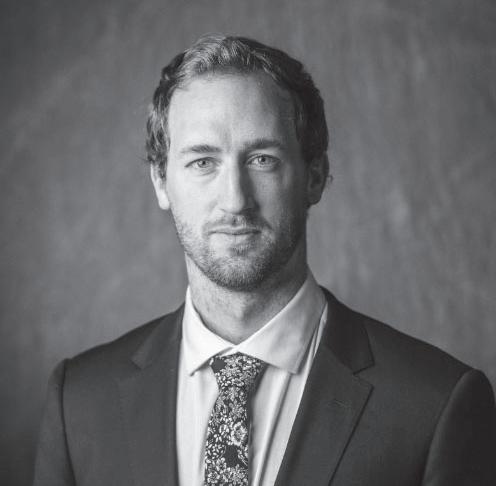
“Eliminating waste in the budget and addressing the drug and crime issues in town will be the immediate priorities.”
Bruns grew up in Michigan but completed his undergraduate and master’s degrees at the University of Dallas, according to his bio on the Hillsdale College website. He moved to Hillsdale after teaching for five years at a classical charter school in Arizona.
Bob Flynn, a former host of WCSR in Hillsdale, won Ward 3 with 66% of the vote, defeating Matthew Kniffin.
“I’ve never run for political office before, so I really didn’t know what to expect,” Flynn said. “Politics is a funny thing, and I’ve learned never to bet on anything — you just don’t know.”
Flynn began working at the radio station in high school — his father had worked at WCSR in the 1950s. His program had no set structure, and he covered topics from news to birthdays. He retired from radio in March 2024.
“I am so confident the City of Hillsdale is in good hands moving into the future,” he said. “It’s exciting to me to see a new generation taking the helm, and I fully expect to see much more of it in the coming years. It’s what will define this city for the next generation.”
Republican Brent Leininger, 5th district county commissioner, won his reelection with 73% of the vote, defeating Democratic challenger Mary Lou Rolak.
“I’m really happy to see the voter turnout numbers,” Leininger said. “To see over 80%, especially in my district, and close to 80% countywide voter turnout was just phenomenal.”
Leininger said one of his priorities is facilitating the district court’s move from the Courthouse Annex to the old LifeWays building at 25 Care Drive.
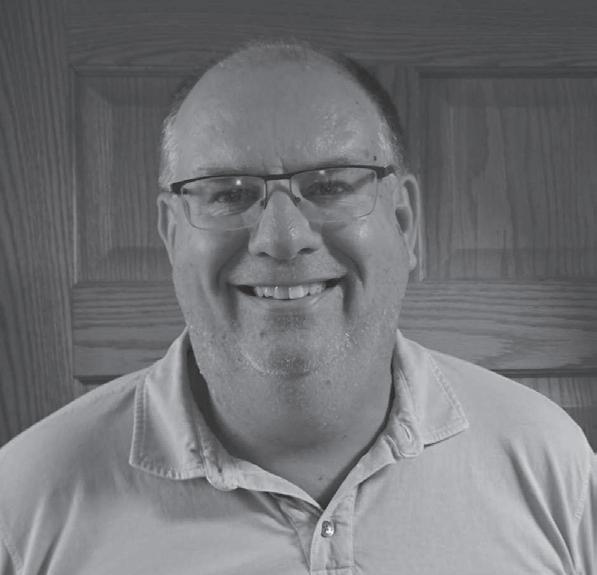
“My focus is mitigating all of those changes and continuing to keep a balanced budget and the operation of essential county services,” he said.
Leininger also won election to the school board for Waldron Area Schools.
Flynn said he hopes to see the city improve streets and bring more retail businesses to Hillsdale.
“I want people to become proud that they are residents of the City of Hillsdale — bring back the pride to our town,” he said. “I look forward to representing those who elected me to

By Catherine Maxwell Assistant Editor
Republican Jennifer Wortz won election to the Michigan State House as the representative for the 35th District, defeating Democrat Don Hicks Tuesday night.
“The people have spoken, and we the people want leadership that preserves our constitutional freedom, protects the American way of life, and defends us from foreign and domestic attacks,” Wortz said. “I look forward to serving our community and representing the values of our district in Lansing.”
Wortz won with 77% of the vote in a district that includes Hillsdale and Branch counties and a portion of Lenawee County. She carried about 78% of the vote in Hillsdale County.
Wortz will replace current Rep. Andrew Fink, a Republican who ran for the Michigan Supreme Court. Fink lost his race to Democrat Kimberly Thomas, 61% to 39%.
“While tonight’s outcome is not what we were hoping for, the last 14 months have been the experience of a lifetime,” Fink said. “I’m proud of our efforts, especially given the relative lack of resources we
had to overcome, in the name of equal justice under law — a cause to which I remain as dedicated as ever before.”
Republican Patrick O’Grady of Coldwater also lost his Michigan Supreme Court race by an almost-identical margin to Justice Kyra Bolden, a Democrat.
Republicans are projected to win the Michigan House with at least a 58-52 majority, according to the Detroit News.
“It gives us some leverage,” Wortz said. “It might just be holding the line and forcing some good luck or concessions when it comes to the budget and some of these financial things that need change.”
The GOP takeover ends total Democratic control of the government in Lansing. For the last two years, Democrats have held the governor’s office as well as both chambers of the state legislature.
Democrats still control the state Senate 20-18.
Hicks said he was disappointed in the outcome but respectful of the results.
“I was hoping to get 30% of the vote or more, and I think I got close to it, so I guess it’s a moral victory,” he said. “You throw your hat in the ring, you
put all your time and resources and energy and you hope for a different outcome, even though you’re a long shot.”
Hicks said as of now he would not run for public office again.
“I want to continue to enhance the educational opportunities for the students of the district,” he said.
Matthew Gordon and Christopher C. Sumnar won election to the Hillsdale Community Schools Board of Education, defeating Jordan Adams and Jeremy Adams.
By Nathan Stanish Ad Manager
Has Hillsdale County always voted Republican?
Since the formation of the Republican Party in 1854 — a year after Michigan Central College moved from Spring Arbor to Hillsdale and became Hillsdale College — Republicans have won a majority or plurality of Hillsdale County’s votes in all but two presidential elections: in 1912, when Progressive Theodore Roosevelt won a 47% plurality and in 1964, when Democrat Lyndon B. Johnson won the county by 144 votes over Republican Barry Goldwater.
Paul Porter, who served from 1975 to 1978, was the last Democratic state representative from Hillsdale County.
How does Trump’s popularity compare to previous Republican candidates?
President-elect Donald Trump is the only candidate in Hillsdale County history to win more than 70% of the vote in three consecutive elections. The last candidate before Trump to win more than 70% of the vote was Ronald Reagan in 1984. Dwight Eisenhower is the only other candidate to win more than 70% of the vote in consecutive elections, in 1952 and 1956.
Four Republican candidates who won more than 70% of the Hillsdale County vote still lost Michigan: Wendel Wilkie in 1940, Thomas Dewey in 1944, Richard Nixon in 1960, and Donald Trump in 2020.
By Alessia Sandala Assistant Editor
Three out of every four Hillsdale County voters supported Donald Trump on Tuesday, and the former president won Michigan’s 15 electoral votes with 49.8% of the statewide vote.
Former Republican congressman Mike Rogers won 72% of the county’s vote in his bid for the Senate, but he lost statewide to Democrat Elissa Slotkin, 48.3% to 48.6%.
“Locally, we‘re ecstatic with the results that we‘ve seen,” said 5th District County Commissioner Brent Leininger, a Republican. “I’m a little disappointed in the local vote for Mike Rogers. The local partisan races were pretty much all guaranteed to be Republicans beforehand, but it’s just great to see the results. I’m even more pleased with the voter turnout.”
Seventy-seven percent of Hillsdale County voters cast ballots, which is 15.5% higher than the county’s voter turnout in 2020.
Michigan Supreme Court candidate and current state Rep. Andrew Fink ’06 lost his race to Kimberly Thomas 61% to 39%. In Hillsdale County, Fink claimed 66% of the vote with Thomas receiving 33%. Republicans captured the Michigan House of Representatives. State Sen. Jonathan Lindsey, R-Coldwater, said retaking the state house is a huge victory for Republicans and the people of Michigan.
“It’s not going to be everything we want, but it’s at least stopped some of this madness that they’ve been cramming down for the last two years,” she said.
“But maybe I’ll become more philosophical about it,” he said. “It was very eye-opening. I really learned a lot, and I’m grateful for that.” Wortz said the results were a “big win.”
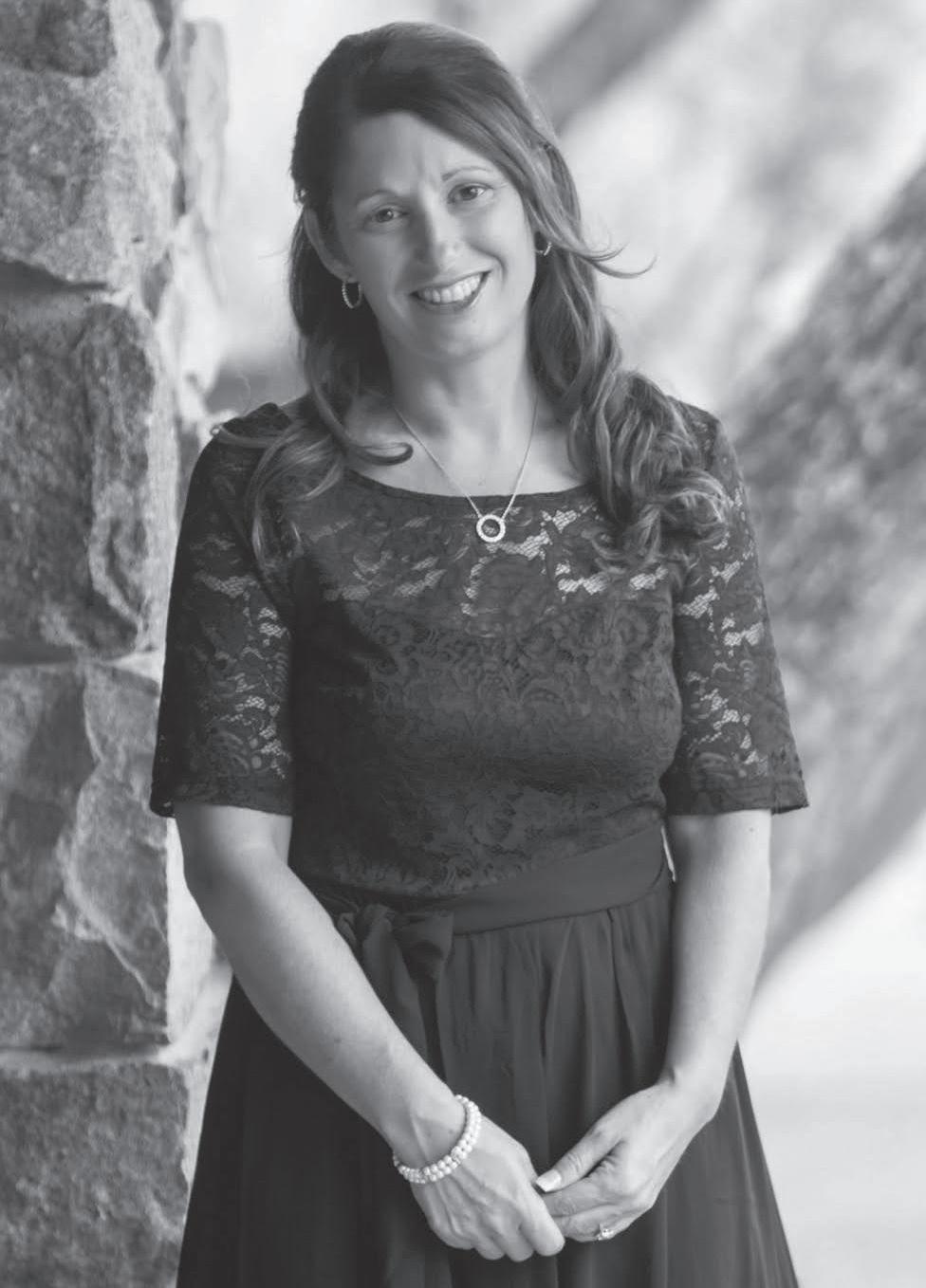
How often does Hillsdale County support the same candidate as the rest of Michigan?
Hillsdale County has supported the same presidential candidate as the rest of Michigan in 31 of the last 43 elections. Of the 12 elections in which a different candidate won the state, seven were in the last nine presidential elections.
The election of 1892 was the only time Michigan split its electors, giving nine electors to Benjamin Harrison and five electors to Grover Cleveland. After a law passed that prohibited faithless electors, every other election has followed the “winner takes all” system, giving all the electors to the candidate with a majority or plurality of the state’s vote.
Who is the most popular candidate in Hillsdale County’s electoral history?
In 1928, Republican Herbert Hoover beat Democrat Al Smith, the governor of New York and the namesake of the political event that Vice President Harris chose to skip last month, when she broke a modern tradition of the candidates from both parties making an appearance. Hoover captured 81 percent of Hillsdale County’s vote and defeated Smith by 62 points — the highest percentage and margin in county history. Hoover won Michigan with 70% of the vote.
Trump’s 17,037 votes in 2020 were the most ever in county history — until he beat his own record this week with 18,627. Sourced through Election Atlas.
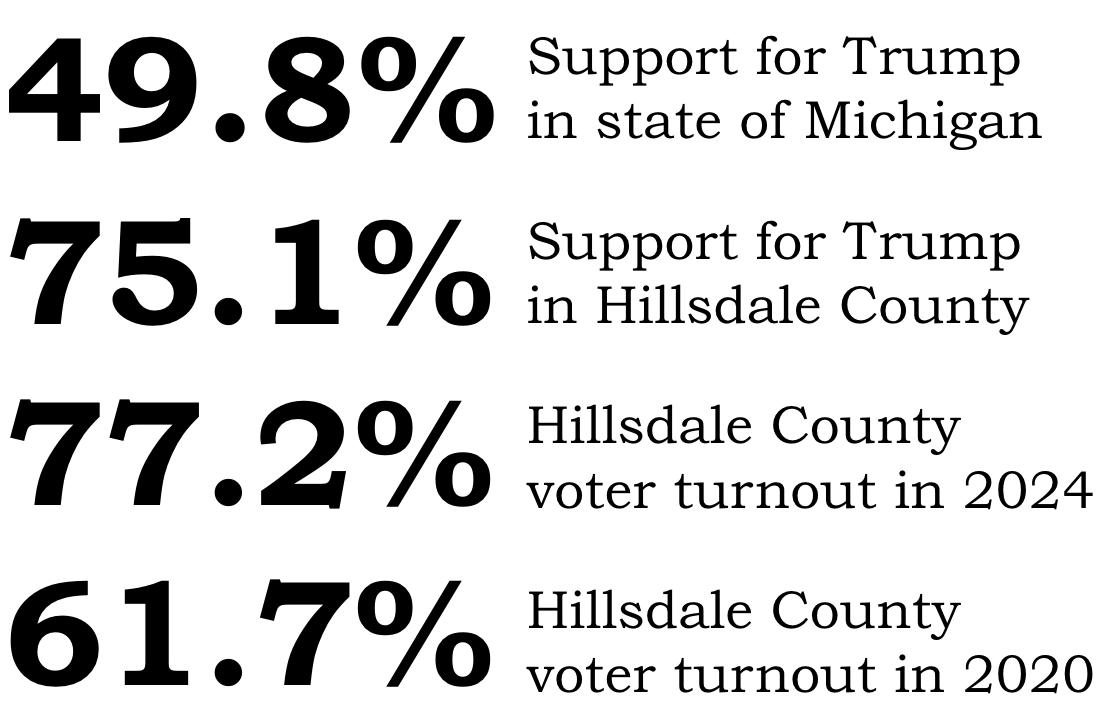
“It is incredibly good news for the people of Michigan that Republicans have regained the state house,” Lindsey said. “After two years of unchecked extremism from the Democrats, the people of Michigan will now have a legislative body that can stand up for all of us. Much more needs to be done, but this is a positive step.”
State Sen. Joe Bellino, RMonroe, said the Republican
strategy paid off across Michigan as they took control of the state House.
“I was thoroughly impressed and enjoyed last night because we won a lot of seats that we targeted and we want to turn over in the state that we wanted to flip,” Bellino said. “We flipped four of them. We had eight in play, the other four really close, but we did a great job taking back the state House.”
Belino said the election is evidence that people in Michigan were dissatisfied with Democratic policies.
“Nothing done by the Democrats the last few years to help grow the economy or grow the population of Michigan,” Bellino said. “And yesterday‘s vote was 100% on our side, saying, ‘Your policies are wrong. Start changing them, or we‘re going to vote more people out of office.’ I thought it was a heartfelt message from the electorate, and they used their hammer and they used it wisely.”
To elect a new mayor, the city council could choose to hold a special election in May, August, or November.
“That‘s likely what‘s going to happen, but that‘s going to be Council‘s decision, whether or not they want to call a special election or let the next mayor pro tem ride out my term,” Stockford said.
Ward 2 Councilman Will Morrissey has been the mayor pro tem for six years and said he plans to become acting mayor when Stockford resigns.
“My plan is to carry out the duties of mayor during that time,” Morrissey said.
Paladino said Morrissey’s long tenure as mayor pro tem makes him a “natural candidate” for the position, but Paladino also said he does not support Morrissey because he disagrees with his policies. Paladino said he and four allies on the city council may propose another candidate to serve as mayor pro tem.
“This one is different, though, because we are ac-
tually acknowledging that we as a council are voting for the next acting mayor,” Paladino said. “Whoever wins that spot is then the incumbent for the election if they choose to run. So, yeah, we might throw someone else‘s hat in. We‘ll have to talk more about this among the council members and see who wants to do it.” Stockford first joined the city council in 2013 and graduated from Hillsdale College in 2015 with a major in politics. In 2017, he was elected mayor. Seven years later, Stockford said serving as mayor has been “one of the great honors of my life.”
“I‘m thoroughly confident I‘m leaving the city in a much better position than it was when I was first elected,” Stockford said. “We’ve got a $5 million budget surplus, essentially a 60% surplus — completely unheard of not just in Hillsdale, but in the state of Michigan. With Meijer coming in and the endowment deal that was worked out with the college, we‘ve had a lot of historic progress. I’m very happy with how my tenure turned out.”
tout the plan as a good investment, but critics sa y it

By Kamden Mulder Features Editor
The Hillsdale City Council voted 5-3 to help finance a $15 million development in Hillsdale’s Three Meadows Subdivision, following an almost threehour public hearing Nov. 4. The hearing presented a range of local perspectives on the issue, as well as comments from the development company and its consultants.
The 22-acre parcel, at 280286 W. Bacon St., will hold 61 single-family homes, 80% of which will be sold at market value, with the other 20% as “income-qualified workforce housing rentals,” reserved for middle-class families, according to the city.
The city will use Michigan’s Brownfield Tax Increment Financing structure to help fund the housing development project by reimbursing some of the project’s upfront costs with property tax revenue in the coming years.
According to council documents, more than $7 million worth of eligible activities will need to be reimbursed over 25 years. Portions of the homeowners’ property taxes will pay the developers, with an intended stop date of 2050. The builder is anticipating $350,000 per year in property tax revenue.
The Brownfield system, which previously accounted for the development of contaminated or historical land, was amended in July 2023 to help reverse the statewide housing shortage, said Joe Augstinelli of Michigan Growth Advisors, the consultants helping Allen Edwin with the project.
“We aren’t going into this blindly,” said Brian Farkas, director of workforce housing for Allen Edwin Homes, during the public hearing. “We are looking at some really old housing stock in Hillsdale. I gotta tell you, we build across the state, and this is exactly the type of market we thrive in.”
Sam Fry, Hillsdale’s marketing and development coordinator, said most Hillsdale property pre-dates 2010.
“In Hillsdale in particular, a lot of the homes we have in the community are older homes,” Fry said. “About 58% of the units in Hillsdale were built before 1970 — we only have 2% that were built since 2010. There really has not been any level of building in the last decade.”
But Ward 4 Councilman Joshua Paladino said he opposes the project because the new homes would be incongruent with the aesthetics of the rest of the city.
“The homes don’t look like
they belong in Hillsdale. They look like they could belong in any suburb in the United States. I don’t want to undermine the character of Hillsdale that way,” Paladino said. “The whole historic City of Hillsdale is three streets. I think we should keep that character.”
The homes, which will sell in the mid-$280-360,000 and rent close to $2,000 per month, according to the builder, will have three to five bedrooms. The size of the home is to supplement the demand for new housing in the city.
“When you look at the vacancy rate for Hillsdale, we are at 0.9% which means for every 100 homes in the community, you’re gonna have one that’s actually available,” Fry said.
City Manager David Mackie said he supports the measure and reiterated the need for new homes in Hillsdale.
“We’ve heard of folks commuting from Fort Wayne, Jackson, Marshall, and Coldwater,” Mackie said. “They’re paying their taxes to those communities and going to their stores and participating in those communities, versus staying here, even though their job is here in Hillsdale.”
Because property taxes will be redistributed to the developer under the Brownfield plan, Paladino opposed Mackie’s point.
“They’ll pay for the infrastructure development, but now you have 61 three-to-five bedroom homes, so we could potentially be talking about 400 new citizens that won’t be paying at all toward current city services,” Paladino said. “What does that mean? The people who currently live here are paying for their police, their fire, their road maintenance.”
According to Paladino, the plan is an act of corporate overreach.
“We are creating a tax increment authority, and that means we’re going to raise taxes on those lots and pay the tax money directly to the corpora-
behalf of the developer.
“The developer is putting their own money and their own financing forward to build out the infrastructure initially so it removes risk and liability from the city,” Fry said.
Typically, if the city were to be responsible for the development of utilities, if the developer walks away from the project, the city would be on the hook, according to Fry.
“We are solely asking for the taxes that we generate to get funded back to us.”
tion as a subsidy,” Paladino said. “Essentially, we will be giving a private organization the power to raise taxes.”
In contrast to Paladino, Fry said he views the project as a risk-free opportunity for the city and an act of good faith on
“The developer is asking for no upfront money from the city. There’s going to be no checks written from the City of Hillsdale to Allen Edwin Homes,” Farkus said. “We are solely asking for the taxes that we generate, get funded back to us.”
Paladino said he questions the lucrativeness of the project.
“The city took the first offer, and their argument is these lots have sat for 20-plus years, I believe, and no one wants to develop them, therefore we
have to take whoever’s willing,” Paladino said. “My perspective is, if no one wants to develop it, that means it’s not profitable. It’s not a project that should be undertaken.”
Mackie, however, said that due to the current housing shortage in Hillsdale, as well as the interest in the homes,the city will likely be able to start paying off the eligible activities soon.
“Allen Edwin could potentially start foundations in the fall. If not, it would be the following spring,” Mackie said. “The faster you sell the homes, the more tax increment it creates, and the faster the eligible activities are paid back.”
Paladino cites the price of the homes as a concern for the Hillsdale demographic, and worries about the fate of the empty homes if they are unable to be sold or rented.
“What do they do when they sit empty? They say, ‘Oh, there’s all this housing that needs to be used. We can use state housing vouchers to bring in new citizens,’” Paladino said. “In other words, this is the model that they’re using all around the country to resettle migrants.”


By Francesca Cella Collegian Reporter
GRAND RAPIDS, Mich.
— Now-president-elect Do -
nald Trump hosted his final campaign rally Monday night, and some Hillsdale students went to witness the historic conclusion.
“I backed Trump for a long time,” Lindsey said. “Part of it’s because I believe he’s the only presidential candidate in a very long time who has represented a political movement that really is about returning the government to a role of serving the people rather than being this top-down monstrosity that is trying to run people’s lives.”
Ryan Wilder, a sophomore at Southern New Hampshire University, said he went because he thought it would be fun.
“You’re with people who share similar thoughts and ideas and beliefs,” Wilder said. “It’s nice to be around people like that. And I want to see Trump. That’s kind of cool, too.”
Wilder said he’s voting for Trump because he has the necessary qualities of a president.
“I think we need someone who can put their foot down,” Wilder said. “There’s a lot of conflict in the world right now. I think we need someone in charge who’s strong and is a leader. And I just don’t see that right now.”
Attendee Kevin Cunningham, head golf professional at Innsbrook Country Club, said he came to the rally because of how important the 2024 election is.
“I just love him,” Cunningham said. “He fights for what he believes in. He’s not afraid to stand up to all the big politicians who just want to control the country and power. He’s a strong figure, but I’m a big supporter.”
Lisa Hotstetler, a nurse at Three Rivers Health and candidate for Vicksburg’s school board, said she has been a Trump supporter since 2016 because he has upheld conservative Christian values.
“He’s against abortion,” Hotstetler said. “He’s pro-family. He’s pro-small business and he cares about people owning their own home. And he’s for the freedom of religion!”
Heather Grant and Jessica Singh headed to the rally immediately after their shifts at Kent County Sheriff’s Office. Singh said they wanted to come show their support for Trump.
“It was super last-minute,” Grant said. “We were at work and we were like, ‘Let’s go. Let’s try.’” Grant said she is supporting Trump this election because of his strength as a leader.
Sherri Hannah, now a nurse at Ascension Borgess, lost her job in November 2021 for refusing to comply with the COVID-19 vaccine mandate. Hannah said she supports Trump particularly because of the change he promises to bring to the medical field.
“The fact that he’s bringing Bobby Kennedy up to tackle some of the Big Pharma and some of the immunizations dealing with autism and chronic disease — I think it’s awesome,” Hannah said. Hannah said she has voted for Trump in all three elections because he prioritizes what she considers the most important issues.
“I am so against abortion,” Hannah said. “I want my borders to be closed. I want safety for my girls — I have two girls — I don’t need them atta kked by an illegal immigrant. I don’t want men in women’s sports. I could go on and on.” Kassim Abduba, an international student from Kenya studying at Grand Valley State University, said he attended the rally to see the inner-workings of American politics.
Attendees stood in line for hours Monday afternoon but Trump didn’t arrive until 12:15 a.m. Tuesday. He spoke until after 2 a.m. and concluded his campaign in Grand Rapids for the third consecutive time.
started off talking about how he was kind of sad because it was his last rally. He was kind of emotional, I think, just recognizing, ‘This is it, no matter what.’”
“It was a very typical Trump rally,” said sophomore Drew Bennet, a member of the College Republicans. “He
Michigan state Sen. Jonathan Lindsey, R-Coldwater, who represents part of Hillsdale County, said he didn’t want to miss Trump’s last rally.
“If he doesn’t win the election, I don’t think Republicans are going to win an election for a long time,” Cunningham said. “So I just think supporting him, it’s important to be here.”
Cunningham said he admires Trump for his strength of character.
“I like what he stands for and how he fights for his country, not just for certain groups,” Grant said. “Especially the assassination attempt — when he was shot, he got right back up and was yelling, ‘Fight!’ I feel like any other person would have ran.”
“I think it’s cool that people are waiting for their president just to hear his goals and what he has to share,” Abduba said. “I can compare and contrast with my home culture. People here are so calm and civilized. People can say anything, they can be pro-Trump or not.”
By Ty Ruddy Assistant Editor
Charger swimming improved its season record to 7-1, defeating Malone University and the College of Wooster in a double-dual meet this past weekend.
The Chargers won nine of 13 events, with other swimmers placing throughout the meet.
Senior Megan Clifford continued her dominance in the 200-yard butterfly, winning with 2:06.87 to stay undefeated in the event on the season. Clifford has already qualified for the NCAA DII Tournament in this event. She also won the 50-yard freestyle over the weekend with a time of 24.71.
“We have been working hard and our coach has been doing a great job preparing us to be mentally ready each weekend to compete,” Clifford said. “It is crucial that we increase the intensity as we approach midseasons.”
Younger Chargers contributed individual wins as well. Freshman Matilyn Wilhelmsen won a pair of distance races, capturing the 1,000-yard freestyle title in 10:53.91 and the 500-yard freestyle title in 5:14.83. These titles earned Wilhelmsen Great Midwest

Each row, column, and bolded region contains one each of 1–9.
Athletic Conference Athlete of the Week. Freshman Ella Shaffer took the 100-yard freestyle in 54.59 and competed alongside freshman Ella Malone, senior Lucia Rutchi, and senior Joanna Burnham to win the 400yard medley relay in 4:06.99.
“Our coach has been preparing us to be mentally ready each weekend to compete. It's crucial that we increase the intensity as we approach midseasons.”
Also among the winners for the Chargers this week were sophomore Irene Del Castro, who won the 200yard backstroke in 2:18.42, sophomore Lauren Kamp, who won the 200-yard
breaststroke in 2:32.68, and sophomore Isabel Ondracek, who won the 200-yard freestyle in 2:02.35.
“Our freshmen swam really well this week, which is exciting for this season and for the future of the team,” sophomore Inez McNichols, who took third in the 200yard butterfly, said.
Additionally, junior Jamie Parsons took third in the 1,000-yard freestyle with a time of 11:41.23. Ella Malone recorded two top-three finishes for the Chargers, placing second in the 200-yard backstroke and third in the 50-yard freestyle. Burnham and senior Elise Mason rounded out the podium in the 400-yard individual medley for the Chargers. Mason placed second in 4:48.23, and Burnham took third in 4:52.93.
“We will continue to train to strengthen ourselves mentally and physically so we can be successful and achieve the personal and team goals we have set for ourselves," Clifford said.
The Chargers travel to Bowling Green State University for a 6:30 p.m. dual meet on Nov 8.

Difficulty:

A path starts at the topleft corner and exits at the bottom right, only passing through squares orthogonally. The numbers around the border indicate the number of squares in that row or column that the path passes through. It cannot pass through bolded barrier segments, and it never passes through the same square twice.



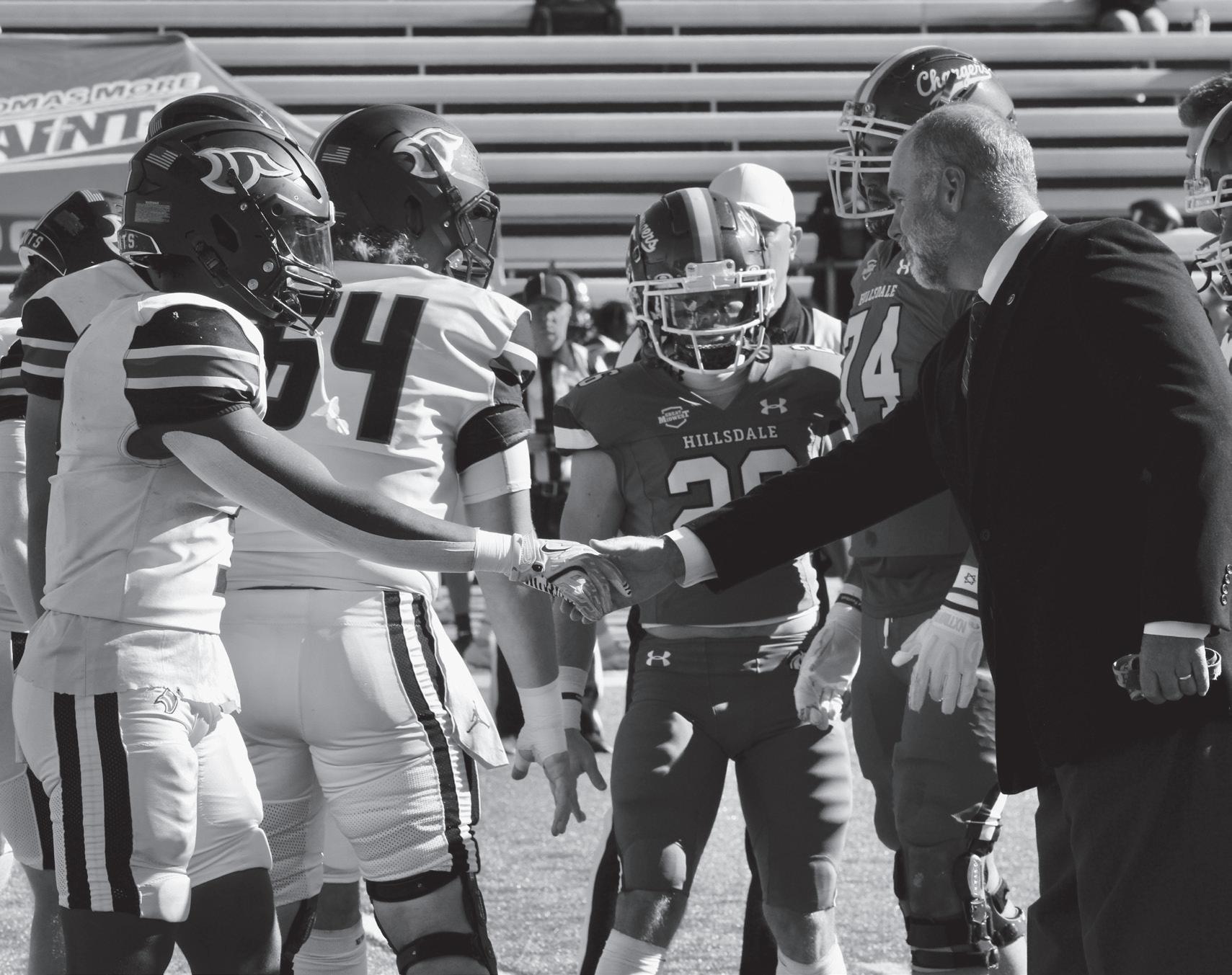
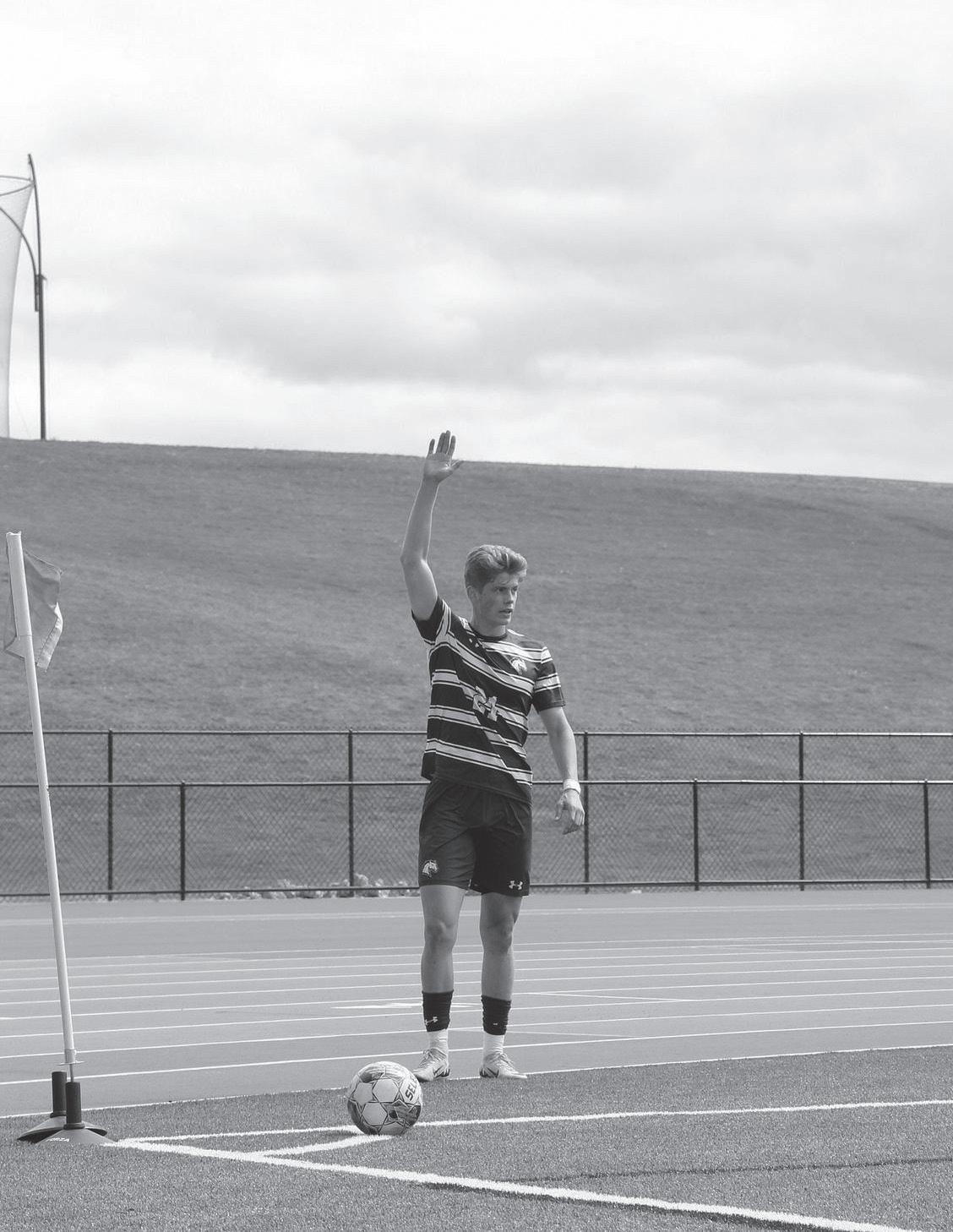
By Moira Gleason News Editor
When junior club soccer player Jude Barton tried out for a spot as a kicker on the Charger football team, he said it was probably the third time he had ever kicked a football. Now, he’s the first club soccer player in more than a decade to walk onto the varsity football team.
“There are only so many ways to kick a ball,” Barton said. “But there are a few noticeable differences, so I’m still trying to get the muscle memory and everything going for kicker.”
Barton said he was playing Legos with his younger siblings during fall break when he received a call from Director of Club Sports Ryan Perkins saying the Hillsdale football team wanted to recruit a kicker from the men’s club soccer team.
Barton told his parents after the call, and they encouraged him to go for it.
“I had already thought I should totally do it,” Barton said. “I thought my parents would be like ‘no, you have to focus on studies.’ So when I heard they were into it too, I said ‘yeah, I’ll give it a go.’”
Barton agreed to a tryout, and Perkins put him in touch with the coaches. The next day, Barton set up a private coaching session with a kicking coach, his first and last coaching session before his official tryout with the Hillsdale football coaches.
The football team began their search for an addi-
tional kicker after freshman kicker Braeden Chiles suffered an injury and missed multiple weeks of practice, according to receivers coach Ryan Stokes.
“We just were curious if there was anybody else that was already on campus from the soccer team, since their season was over, that could step in and provide more depth to our specialist room while we had some guys banged up,” Stokes said.
Without Chiles, the team was down to two kickers — redshirt sophomores Evan Mick and Ian Woodyard — and the coaches didn’t want to make them kick every rep in practice.
“We loved when we had three kickers, so we could separate the units and they could all take reps off each other,” Stokes said.
Stokes was the first to suggest bringing on a guy from the soccer team, having played both soccer and football himself in high school before playing as a kicker for the Grand Valley State University Lakers. In tryouts, Stokes said he could see Barton had potential.
“One of the first things I noticed was how good his ball rotation was for a guy who hasn’t kicked much,” Stokes said.
After a second-round tryout with the coaching staff, they offered him a spot on the team. Barton said the transition from soccer to kicker was not difficult for him despite the addition of shoulder pads and a helmet.
“Soccer is what I’ve done my entire life,” Barton said. “I watch soccer way more than I watch football. I’m better at it too. But I do really like the professionalism that goes with doing an actual DII sport, and I’ve had a great time so far.”
Redshirt sophomore wide receiver David Dorn said he has known Barton and his family since fifth or sixth grade, and they went to high school together.
“His mom told my mom, and that’s how I found out,” Dorn said.
Dorn said his mom texted him to tell him Barton made the team before the coaches had announced the decision. He said he was both surprised and happy when he heard it was his former classmate.
“There’s a lot of soccer players they could have picked. It’s just funny,” Dorn said. “He never played football in high school. He played soccer — he was a really good soccer player.” Stokes said Barton is smart, a hard worker, and a great fit for the team.
“What he can do athletically out on the football field for us definitely comes third to being a great human being and being a great student first,” Stokes said. “Those are two things he does well. Whatever else he can do on the football field is a bonus.” Stokes said the coaching staff hopes Barton will stay on the team past this season, but he’ll have to earn a starting spot.
“He definitely has the ability to compete, and that’s what we expect him to do every week, and we’ll see where it goes from there,” Stokes said.
The coaches have been supportive and understanding as he adjusts to the team and the sport, Barton said.
“I’ve had a ton of questions coming into the team, even just a ton of basic, stupid questions like, ‘what are we supposed to wear for practice? When am I supposed to come in?’” Barton said.
Though Barton joins the team with only a few weeks left in the season, he said the other players have made him feel welcome in the group.
“I think he’s just trying to learn everyone’s name,” Dorn said. “That’s probably the hardest part.”
By Nathan Stanish Senior Reporter
Two weeks ago, The New York Liberty beat the Minnesota Lynx 67-62 in Game 5 of the WNBA finals to clinch its first franchise championship, and the game was a disaster.
Officials gave the Liberty 25 free throws and the Lynx eight, after the Liberty averaged 17.3 free throws attempted per game in the regular season and the Lynx averaged 15.5. In the last five seconds of regulation, Liberty forward Breanna Stewart received two free throws to tie the game after supposed contact on her shot. The replay showed no such contact and also a travel that went unpunished, yet officials upheld the call.
Several basketball stars took to the internet to attack the officiating. LeBron James, Damian Lillard, Isaiah Thomas, and Candace Parker all
condemned the referees, and several highlighted that final play as particularly egregious.
Beyond the poor officiating, both teams struggled offensively. The Liberty shot 30.6% and only 8.7% from three, while the Lynx shot 37.1% and 15.8% from three. Only two players, Napheesa Collier and Kayla McBride, scored 20 points or more, and both play for the Lynx.
Despite all the controversy and disappointing play, about 3.3 million people tuned in to ESPN to watch the game. That is the best viewership in 25 years for the WNBA, even though the WNBA had to compete with Sunday Night Football and baseball’s National League Championship series.
More importantly, the viewership outperformed all Caitlin Clark games this season. Clark averaged more than a million viewers per game and shattered attendance re-
cords for her team, the Indiana Fever, but it’s clear that a sizable chunk of fans introduced to the WNBA through Clark have stuck around for games that don’t feature her. If the WNBA can continue to capitalize on the spike in viewership by improving the officiating and leaning into its starpower, it may someday turn a profit. The league signed a new media rights deal in 2024 that guarantees $200 million annually for 11 years, a 400% increase over the annual value of the last deal. The deal also includes the possibility to revisit in 2028.
This season, the WNBA lost $40 million. But if a finals Game 5 with questionable officiating, poor shooting, no Caitlin Clark, and serious competition from other major sports can attract 3.3 million fans, the league may become profitable in the near future.
By Ty Ruddy Assistant Editor
Graduate student Graham Delano has taken an unconventional path to Hillsdale College. One that saw him leading a team of dog sleds in the Rockies and teaching middle school in Nashville. Today, Delano is pursuing a Master of Arts in Classi cal Education and, this fall, he accepted another role on campus: men’s club soccer coach.
Soccer has been a constant in Delano’s life. His brothers introduced him to soccer when he was young, and it became a passion.
“I have two older brothers and I am probably the most competitive one. I always needed to beat them,” Delano said.
ciated that he focused on the fundamentals of the game, but beyond the game he has been a great mentor since my time at CCU.”
After graduating with a degree in health sciences, Delano spent some time working with a company that gave leadership lessons to schools in Denver. He then returned to CCU
By Cassandra DeVries Collegian Reporter
Hillsdale College club rugby finished its season with a playoff loss to Xavier University for the Allegheny Rugby Union West Conference title on Nov. 2, ending with a 4-1 record.
“This was our first season in the conference, and we were playing much better teams than we've ever played before,” senior Brendan Henzel said. “We’ve done really well.”
Juniors Andrew Agbay and Israel “Izzy” Meyers both scored a try for the Chargers.
Xavier scored twice early in the game, but Hillsdale rallied right before halftime, according to Henzel.
would just pick and go. Eventually, Izzy broke through.”
The Chargers held Xavier at 12 points for most of the game, but Xavier scored two more tries at the end, bringing the final score to 22-10, according to Hickey.
“I think we played better in that game than we’ve ever played,” Henzel said. “The new competition is much better, but we had that game for a sec-
much if we lose.”
The rugby team is divided into forwards, who are the main hitters, and the backs, who focus more on running plays.
Pangrazio said junior captan Judah Newsom volunteered to train the backs this year.
“Judah stepped up to train our running backs, and that was super helpful, because Charlie was spearheading the tactics for the forwards,” Pangrazio said. “He runs conditioning, as well as organizing different plays and whatnot with the backs. Organization has just improved a lot.”
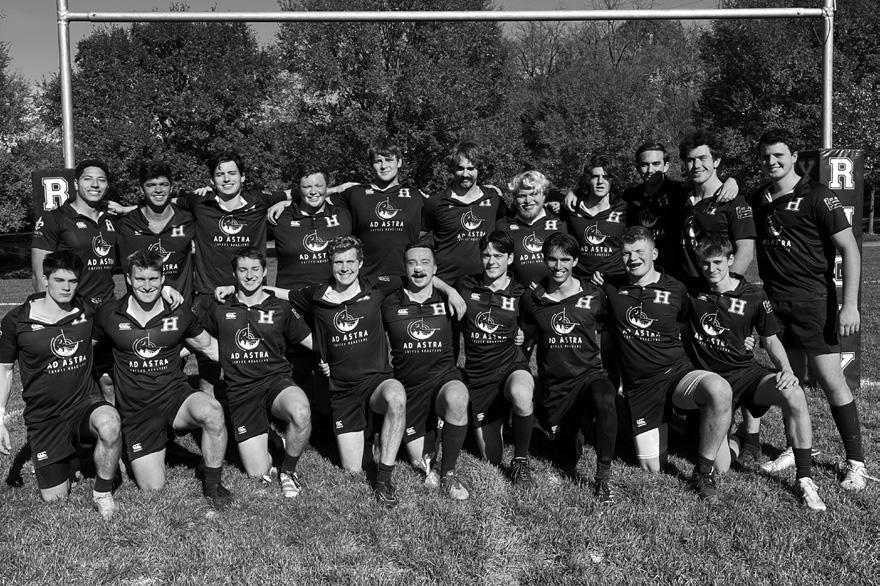
“Andrew broke through their line at midfield and ran all the way for the touchdown, like 50 yards away,” Henzel said. “That was awesome for our first score.”
Freshman and student coach Charlie Hickey agreed.
“Andrew just shrugged off five or six different guys all trying to attack him,” Hickey said.
Immediately after halftime, Meyers scored a second try for the Chargers.
“That was a great score, too,” Henzel said. “We had it at the five yard line, and we
ond there before we let it slip.”
The Saturday game was Henzel’s last with the team before graduation. He is the only graduating senior on the team.
“He’s been playing for years, and he's a great player,” junior Elijah Pangrazio said. “It'll be sad to lose him.”
While rugby only played five official games this fall, they played four additional unofficial games, or friendlies.
“We don't really count friendlies, mostly because we try to play really good schools on our friendlies just to get the guys more experience,” Hickey said. “It doesn't matter as
In the spring, Hickey said the team will play sevens, a variation of rugby with seven players instead of the usual 15.
“It's very fast paced, 15-minute games with more running and scoring and a lot less smashing,” Hickey said.
Despite the playoff loss, Henzel said the rugby team has drastically improved overall since he joined as a freshman.
“It was very casual. The team as a whole definitely wasn't as serious. We've had a couple coaches who have just been really great, and they've kind of pushed the team together,” Henzel said.
that might relate to his newfound interest in classical education.
“When I was teaching, I noticed that many of the boys had a hard time sitting still. I thought ‘there has to be a better way to educate these kids,’” Delano said. “Over the past couple of years I’ve been thinking about what it looks like to tie in the physical component of education to set up a system based on the gymnasium.” In his research, Delano discovered Hillsdale College’s 1776 curriculum. It was not long before he applied to the Diana Davis Spencer Graduate School of Classical Education.

As Delano matured in the game in high school, he decided he would try college soccer. Colorado Christian University reached out with an invitation to a camp, lat er extending an offer with a scholarship for soccer, and Delano found himself braving the altitude of Denver and the Rocky Mountains for his college career.
“After I toured I knew I needed to be at CCU,” Del ano said. “I think it was the providence of God because it ended up being a great fit for me.”
and coached until 2020. COVID-19 upended CCU’s season that year, so Delano matched adversity with adventure. He built out the

Delano discovered an unexpected perk of Denver when he began to attend CCU, he said. The mountains fed his lifelong love of skiing and the outdoors. But college wasn’t all powder and skis for Delano. He said CCU played some of the best soccer teams he had seen up to that point in his career. Thanks to the level of play, he was able to improve his game as well.
“My freshman year was rough. We played in a good conference and took some heavy hits as a team,” he said. “But by my junior year we had improved.”
Delano attributed the success he found later in his career to Gary Evans, who played professional soccer in England and America before joining the CCU staff. The two have maintained a good relationship since Delano started his graduate work at Hillsdale.
“I still get lunch with Gary every time I am in Denver,” Delano said. “I always appre-
his Ford Ranger with a truck tent, a stove, and a few shelves of food and drove north. The road took him across Colorado, through Montana and
This fall, Delano became the men’s club soccer coach.
“Jacob Beckwith asked me in the spring if I would like to coach the club team and it has been nice to knock off the rust,” Delano said. “I hadn’t coached in a couple of years, but I came in with the goal to bring a new perspective to the team.”
The men’s club soccer team posed a unique challenge in coaching that Delano had not encountered at CCU. He said he has been trying to find the right balance between intensity and fun in coaching a student-led team. He recognized that asking his players to devote their whole semester to the team would not work but he wanted to set the players up for success.
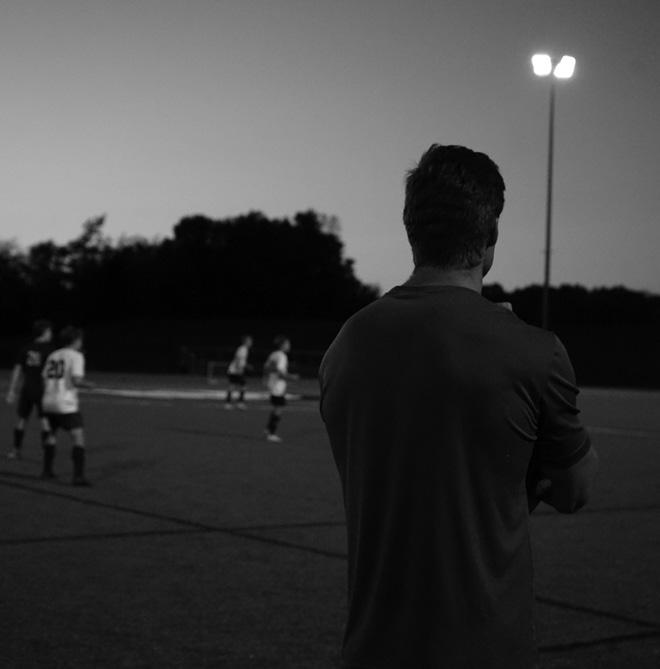
Wyoming, and eventually into the Canadian Rockies.
“I’ve never totaled the miles I drove but the trip took me about three months,” Delano said. “The American west is majestic. Beautiful. To live like that for a while was a dream.”
Delano moved to Idaho for a brief time to run a mobile coffee shop before settling in Nashville for a middle school teaching job. He began to think more about his love for athletics and how
“The team is lucky to have a coach with Graham’s background along with the physical capability to show his players what he wants,” senior player Max Aylor said. Although the team’s record this year was 3-6-1, Delano said he plans to return and looks forward to growing with the team.
“We lost a few close games to some good teams this past year,” Delano said. “We know we have potential.”
Luke Martin ‘17, assistant coach for the men’s club soccer team this year, said Delano’s character gives the team confidence moving forward.
“Since I have known Graham his kindness and humility have stood out,” Martin said. “Plus I know with his skill, passion, and experience he has what it takes to lead a team to success.”
What are your pre-meet routine habits?
My pre-meet routine consists of blasting music, drinking lots of water and eating a little fruit; I prefer throwing on a rather empty stomach. I also make a point to pray and repeat Philippians 4:13 or John 3:16 in my head while warming up.
Compiled by Michaela Estruth
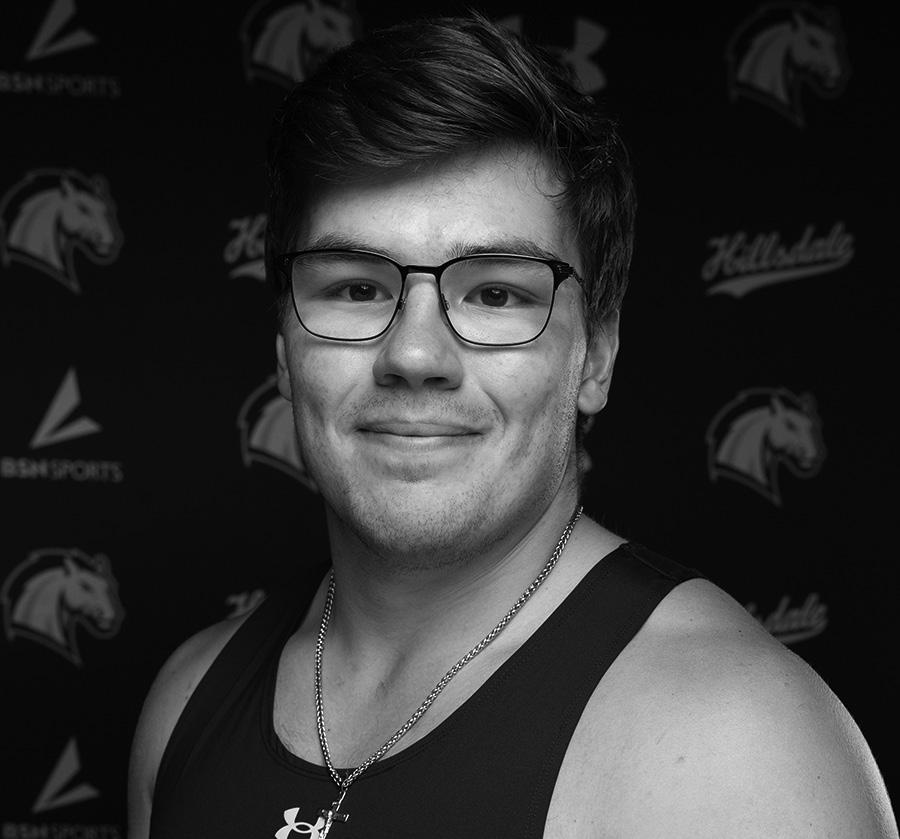
What is your go-to meal as soon as a meet ends?
In high school, I would go to Wendy's after a meet and Buffalo Wild Wings after bigger meets.
What is your favorite holiday and why?
Christmas because the family atmosphere is unmatched and the holiday feelings are at their peak.

By Alex Deimel Senior Reporter
The football team won its third straight game last Saturday, defeating the Thomas More University Saints 38-17 at home on Military Appreciation Day and improving its season record to 4-5, after an 0-4 start.
The Chargers took an early lead and never looked back, making it back-to-back games in which the team didn’t trail the entire game.
“As a team we’ve been very smart,” sophomore quarterback Colin McKernan said. “We’ve been reading our keys well, and I’m confident that
this team can win out.”
McKernan finished with 14 completed passes on 22 attempts for 170 total passing yards, including one touchdown through the air and two rushing touchdowns. He now has 1,247 total passing yards in his first season as a starter.
The Charger quarterback also spread the ball around to nine different receivers on Saturday, with the most receptions going to sophomore wide receiver Connor Pratt. Pratt hauled in five passes for 26 yards, including a fouryard catch that gave Hillsdale a 14-0 lead at the end of the first quarter.
Senior wide receiver Logan VanEnkevort continued his streak with another game of more than 100 rushing yards, finishing with 133 yards and bringing his season total to 548 in only seven games.
“I think this was a great week,” VanEnkevort said. “Defense definitely played their hearts out. Holding a team to negative four rushing yards doesn’t happen very often.”
The Chargers continued their domination of the run game, putting up a net total of 273 rushing yards from eight different players, as well as four of Hillsdale’s five
touchdowns coming from the ground game. In addition to McKernan’s two rushing touchdowns, senior running back Kyle Riffel and sophomore wide receiver Shea Ruddy scored rushing touchdowns of their own. Ruddy extended his Great Midwest Athletic Conference lead in all-purpose yards, totaling 1,542 on the season.
“We’ve definitely found our stride these last few weeks,” Ruddy said. “We just have to keep doing our thing, and prepare hard this week since we have a tough opponent this week.”
Defensively, Hillsdale stymied the Saints’ running
game, holding Thomas More to negative four rushing yards through four quarters.
Senior linebacker Jake Maloney had a season-high six tackles, which led all Charger defensive players. Hillsdale had a combined total of four sacks, including one each from senior defensive lineman Hunter Sperling and junior defensive lineman Neal Likens.
In addition to the dominance on the front lines, the Chargers combined for six pass breakups, including two from senior defensive back Matt Soderdahl, who leads the team with seven this season along with his three
interceptions. Soderdahl is followed by senior defensive back Vince Francescone, who snagged his second interception of the year right before halftime.
The Chargers will look to extend their win streak in their final home game against their G-MAC rival the Tiffin University Dragons this Saturday Nov. 9 in the annual Senior Day and Blue Out game at 1 p.m., during which they will look to avenge a 35-21 loss to Tiffin last season.
By Ellie Fromm Assistant Editor
The volleyball team swept its weekend of home competition, winning all three games 3-0 and improving to 10-1 in the conference. They are riding a five-game win streak.
The Chargers beat the Ursuline College Arrows 25-20, 25-11, and 25-13 on Oct. 31. The next day, they played the Ashland University Eagles,
“It was a good weekend. Everybody contributed. Everybody.”
winning 25-14, 25-23, and 25-22. On Saturday, they beat the Lake Erie College Storm 25-21, 25-15, and 25-23.
Hillsdale is now the only team with only one loss in the Great Midwest Athletic Conference, placing them at first in the G-MAC North standings.
Head coach Chris Gravel said his entire team contributed to the wins last week, and he enjoyed seeing many of his players get the opportunity to compete.
“We got to do a lot of different lineups,” Gravel said. “It was a good weekend. Everybody contributed. Everybody.” Point leaders for the Char-
gers over the weekend were seniors Lauren Passaglia with 28.5 points and Marilyn Popplewell with 28 points, according to Director of Athletic Communications James Gensterblum.
Passaglia said she thought it was good to see players beyond the usual starting lineup receive chances to grow and use the skills they have practiced.
“We got to see a lot of people on the court contributing,” she said. “I think it’s really cool to see other people step up when they’re given the opportunity.”
This weekend, the Chargers are hosting again at Dawn Tibbetts Potter Arena. They play the Tiffin University Dragons on Nov. 8 at 7 p.m. for White Out Night. They will face the Findlay University Oilers Nov. 9 at 5 p.m. for USA Day.
Findlay is currently ranked second behind Hillsdale in the G-MAC North standings. Tiffin is ranked fourth in the G-MAC North, but beat Hillsdale in their last matchup Oct. 12.
“These are two big games,” Gravel said. “Tiffin beat us last time and then lost to the team right behind us [Findlay] in our division.”
Gravel also expressed appreciation for the attendance of the games by the community and student body.
“The fans are great,” Gravel said. “There’s a lot of people there, and our students are actually hilarious.”

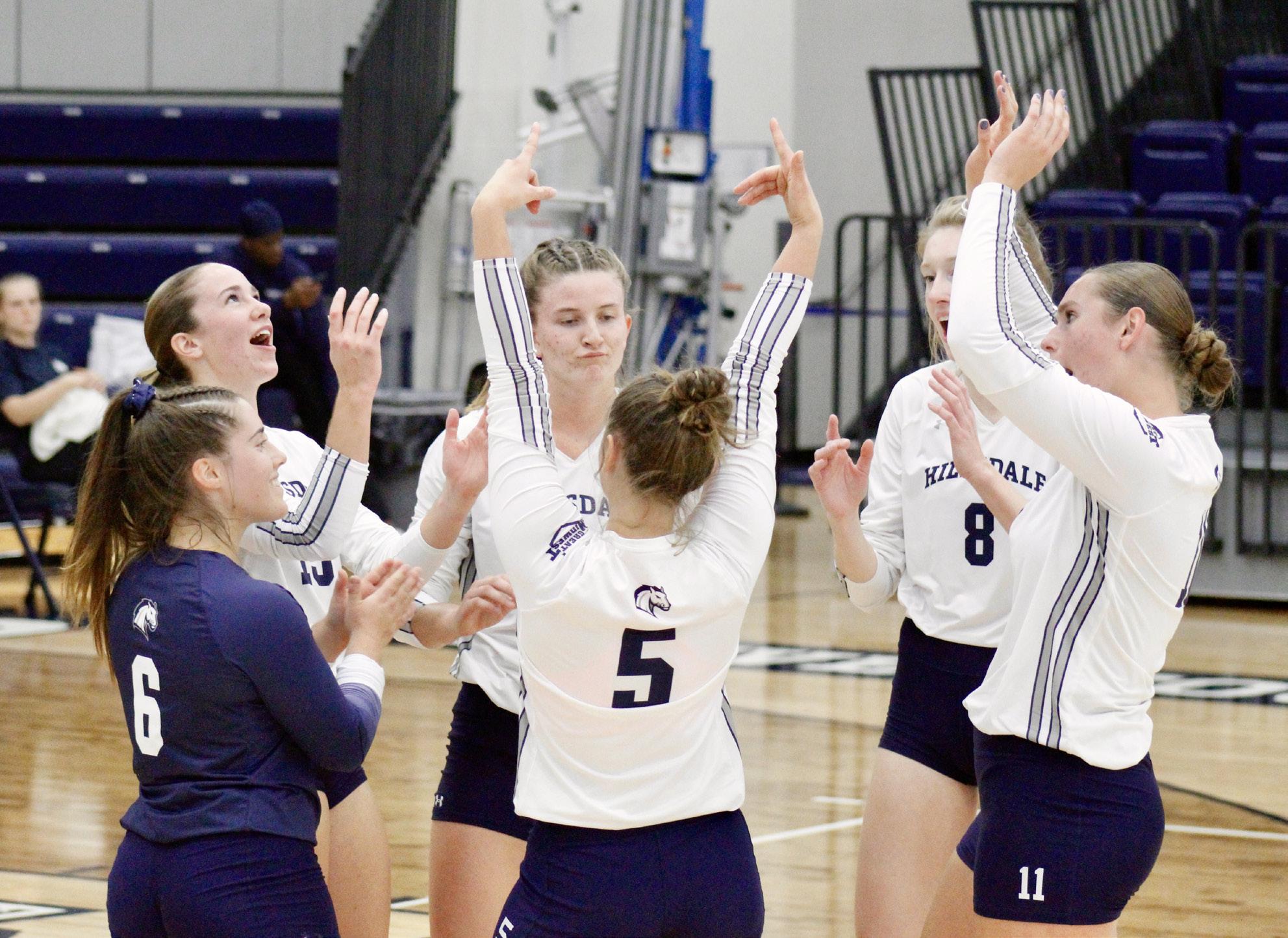
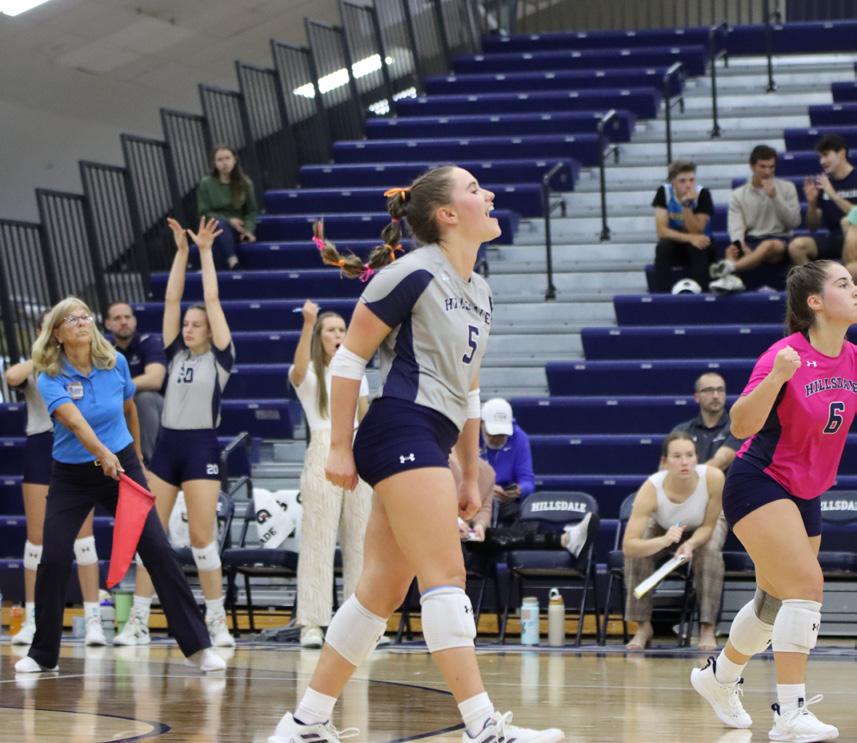
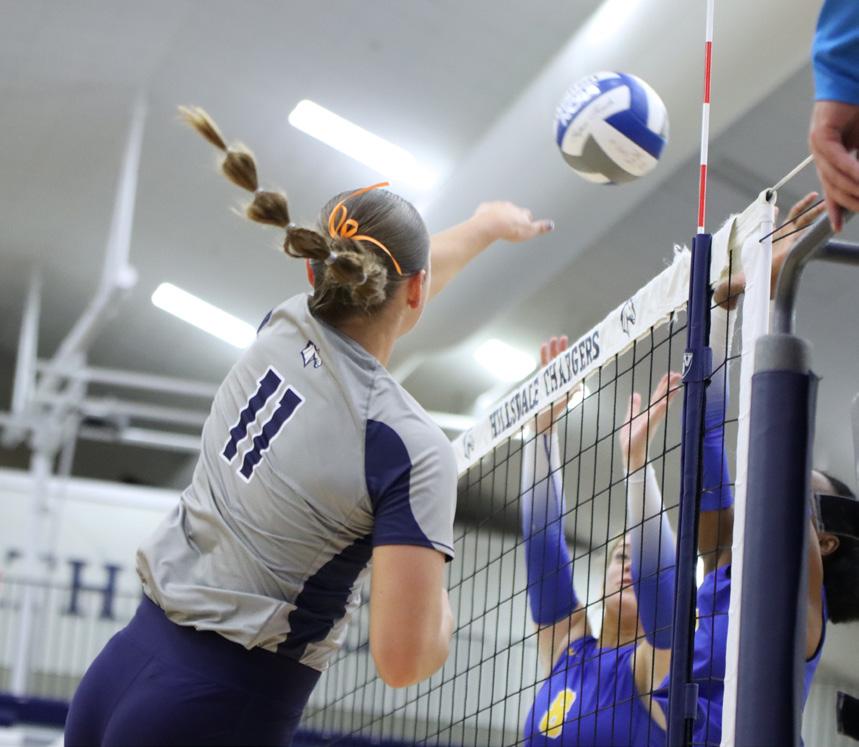
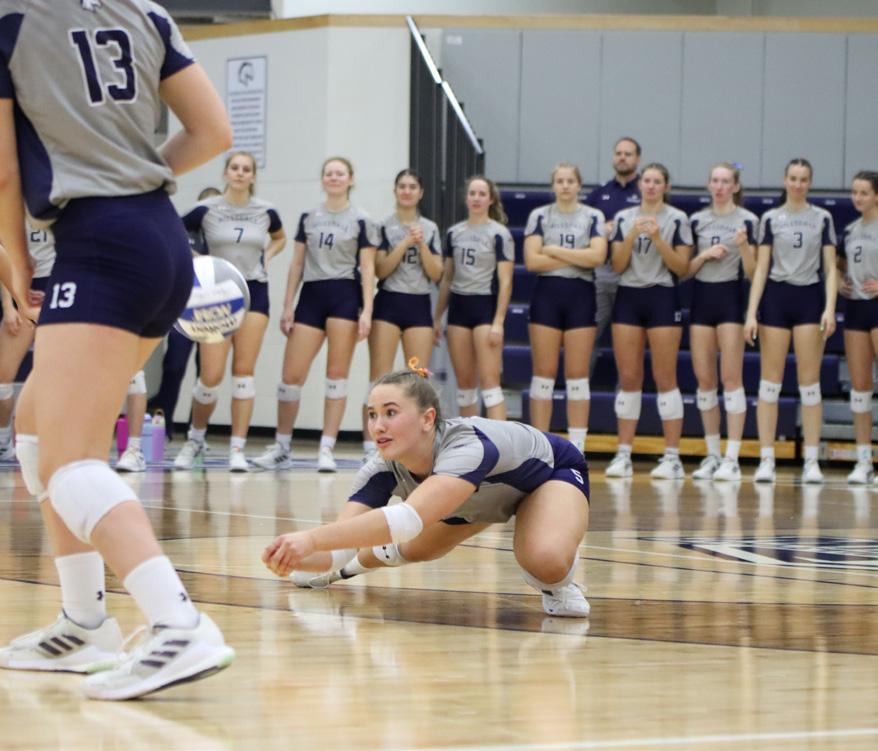

By Anna Broussard and Colman Rowan Assistant editor and Culture editor
The campaign and election season has drawn to a close, and students from the Washington Hillsdale Internship Program are experiencing Washington, D.C., as it prepares for a new president.
“We had a little Hillsdale election watch party in one of the class spaces that we have,” junior Adeline Kaufman said. “I would say everyone has been very cautiously excited over the past week, not wanting to get their heads up too much, but at the same time, taking in all of the information, a lot of signs pointing in a positive direction.”
Kaufman, who interns for the Center for Education Policy
at the Heritage Foundation, said at the office many have been anxiously awaiting the results of the election for the last few weeks.
“It felt a little bit like Christmas Eve on Monday night,” she said. “We were like, ‘I don’t know what tomorrow is going to bring,’ and I hope it’s going to be good.”
With recent Vice President Kamala Harris’s election night rally taking place in D.C., Kaufman said the Capitol Police were no more present than usual.
“My boss described the city accurately when she said, ‘obviously there’s some barricades up by the White House and by the Capitol, but the city is much less boarded up than Twitter would have you believe,’” she said. “Honestly, things have been surprisingly calm.”
Although the atmosphere in D.C. has remained calm throughout the weeks leading up the election, the day after the election was filled with excitement both at work and at Hillsdale’s D.C. campus, Kaufman said.
“The morning was actually rather quiet, because people were up so late last night a lot of staff rolled in later in the morning, but it was just every time someone came into the building, it was very celebratory,” Kaufman said. “It felt like a huge sigh of relief across the board. Then we had an all staff meeting with the president of the foundation, Kevin Roberts, and that was a very exciting event to hear the plans moving forward.”
Both junior Joel Esler and senior Eli Redding said they saw a noticeable lack of people
out in the city on Wednesday after the election.
“Just walking to work, there was no one out,” Redding said. “Like that was the thing, it was the most empty walk to work ever.”
Esler attended an election night party with D.C. based conservative think tank American Moment.
“Around 12 a.m. yesterday, and people were starting to leave the party because they hadn’t called a state in a little while, when the people hosting showed up with McDonalds,” Elser said. “There were so many nuggets, there were so many fries. Earlier, there were hors d’oeuvres, which waiters were offering, but now, instead of hors d’oeuvres, there were McNuggets on the plates that they would walk around with, and you could dip them in
sauce. Victory tasted pretty good for 12:30 in the morning.”
Esler said there was some tension at the Hillsdale in D.C. campus before the election, but ultimately there was celebration.
“People at Hillsdale were a little nervous before the election, I think,” Esler said. “They were joking like ‘Oh, are we gonna have a country tomorrow?’ But in general, people are pretty happy.”
Senior Eli Redding leads ghost tours of bars at night time.
He said one night he spoke with some women concerned with abortion rights when they asked him what he thought about the election.
“I was pretty open and honest,” Redding said. “First of all, I think you know Jesus is still on the throne. No matter what happens, I’m not really too
concerned about it.” As a conservative in disagreement, he said he went on to talk about the voting with them and said it never got too heated.
“So far I’ve had a couple of political conversations with people, and it’s never turned angry,” he said. “I think it’s just about the way you can present it.”
Redding said he celebrated the Trump win as soon as he learned about it.
“When we watched Trump win around 2:30 in the morning, we all took a shot, and did our little Trump dances.”
Therese Williams contributed to this article
By Anna Broussard Assistant Editor
With the cold weather setting in, students from California — known as the Golden State — are seeing the fall colors change for the first time.
“When I saw all the leaves change colors and all of them falling it was almost like a
fairy tale to me,” freshman Hailey Corona said. “You just don’t get that in California.”
Corona, who is from Southern California, has experienced temperatures around 116 degrees, but has never been in a climate where cooler weather begins in September.
“It doesn’t get cold until the holidays,” she said. “That makes me a little sad because I feel like I should be home with my family since it is cold.”
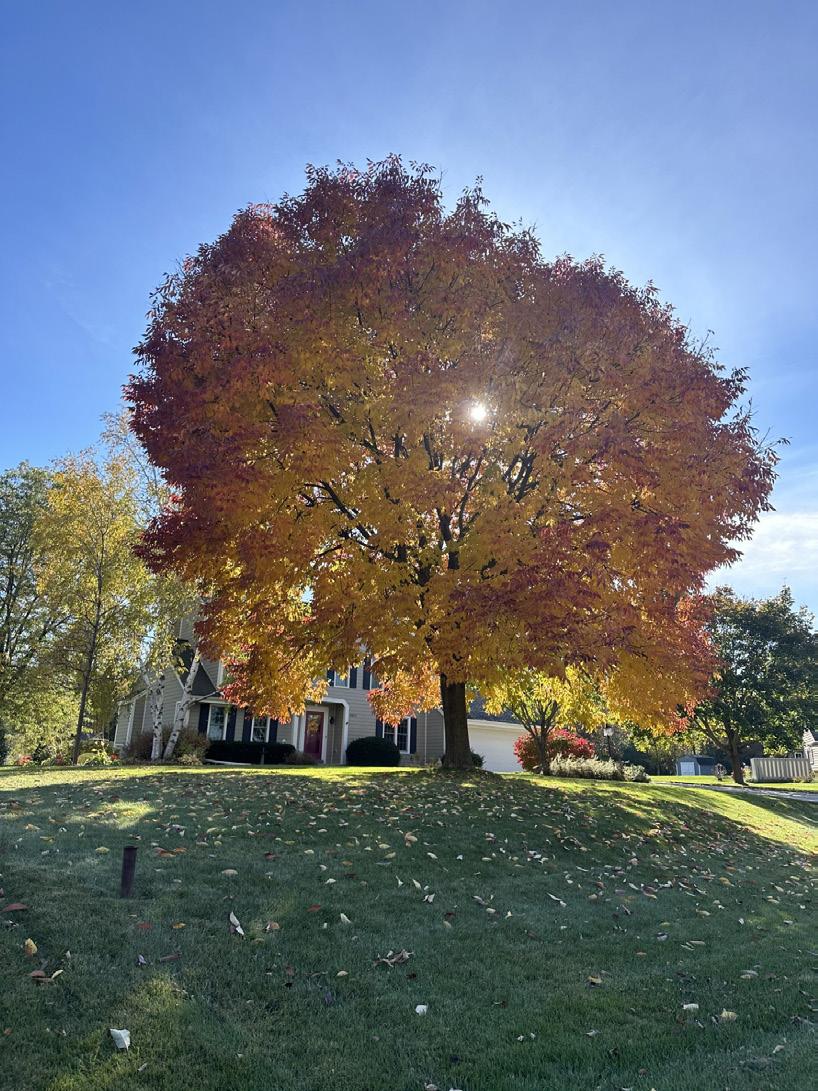
Although Southern Californians are often surrounded by palm trees, according to Corona, the warmer fall weather does not stifle traditions.
“When it gets to the colder seasons people in Cal -
ifornia try to act like it’s super cold,” she said. “All of my friends are obsessed with the fall aesthetic.”
Freshman Bruno Gigliotti, who is from Pasadena, California, said many Califor nians hold the same fall traditions as Midwesterners.
“People have the same traditions — there are still pump kin patch es, corn mazes, and people do love pumpkin spice,” he said. “Even in California, you can wear a flannel, just not with a jacket.”
weather,” he said. “You can wear outfits with a sweater that looks better, in my opinion, and also, I really like the colors on the trees.”
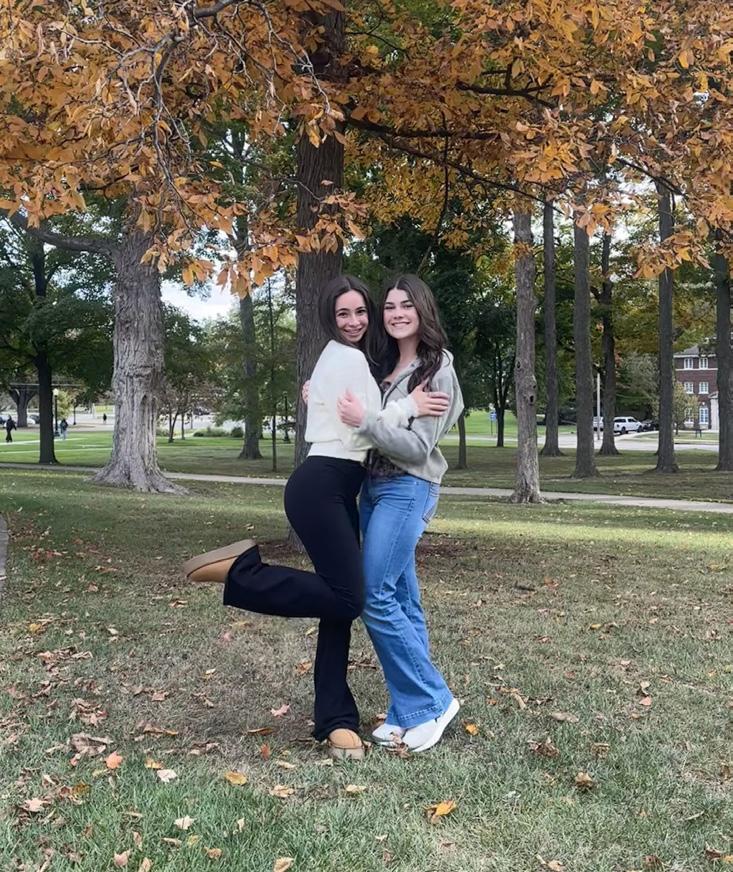
Although the colder weather has been an adjustment, Gigliotti said his favorite aspects of fall are the leaves changing and new additions to his wardrobe.
“I like how it’s sweater
Junior Analise Hess, who lives outside of San Diego, is in her third Midwestern fall. Hess said that with her experience, she notices how much the weather affects people’s moods throughout the
“Everyone in California is very laid back and chill, and I think that’s because we have such great vitamin D exposure,” she said.
“Here, I feel like everyone is trauma-bonded because of how cold and miserable it is.”
According to Hess, Midwestern friendliness is a product of the extreme seasonal
weather changes.
“I think everyone is friendlier to each other, because they kind of have to rally around each other when it gets a little bit dark and depressing,” she said.
For Corona, the weather changes have made noticeable impacts on her as it has gotten colder and darker.
“I kind of always thought seasonal depression was a little bit of an excuse, because I never experience cold coming from California,” she said.
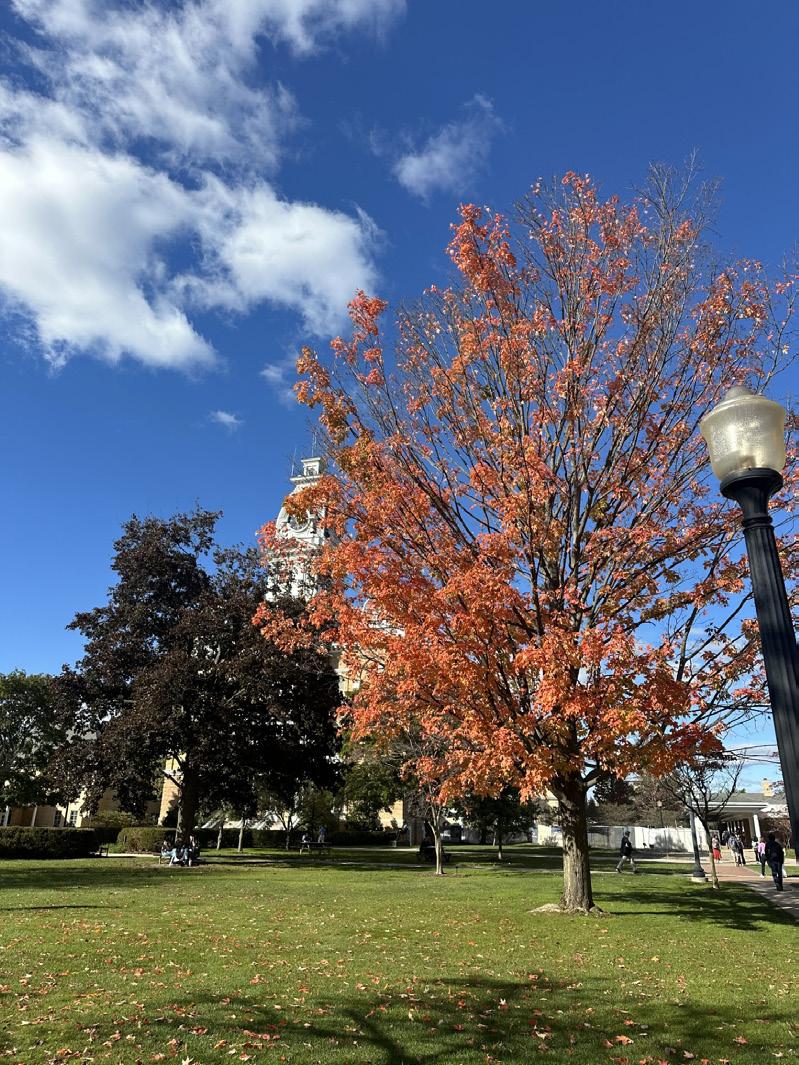
“I
“I
“But my mood has changed rapidly since fall started and it is getting cold outside.”
Although the weather begins to get dark and cold, the beauty of the leaves makes it worth it, Corona said.

By Thomas McKenna City News Editor
It takes only three minutes to zip the half-mile from Simpson Residence to the Splex on an electric scooter. Walking takes about 12 minutes, and for a growing number of players on the Hillsdale football team, that difference is enough to justify the purchase.
“Believe it or not, it actually gets you from Simpson to the sports complex faster than a car,” said freshman Ryin Ruddy, a defensive back for the football team. “With a car you have to go park and everything, but with a scooter you can go right up to the door.”
Ryin and his brother, Shea Ruddy, journey to the George C. Roche Sports Complex (Splex) everyday — sometimes twice per day — for practices and lifts.
“I don’t want to have to walk there every time,” Shea said. “I just figured it was a good investment to get a scooter.”
At least eight of the football players own scooters that they ride around campus, according to the Ruddy brothers. The model of choice, for most riders, is a Hiboy S2 Electric Scooter, which costs about $300, according to the company’s website.
The trend started with junior Connor Pratt, whom Ryin said got the first scooter among the players last fall. Then, other players started to see the benefits. Shea got his scooter in the spring, and Ryin bought his over the summer.
Players say convenience is the main reason behind their rapid acquisition of electric scooters.
“It’s just a good way to get around,” Shea said. “It makes it
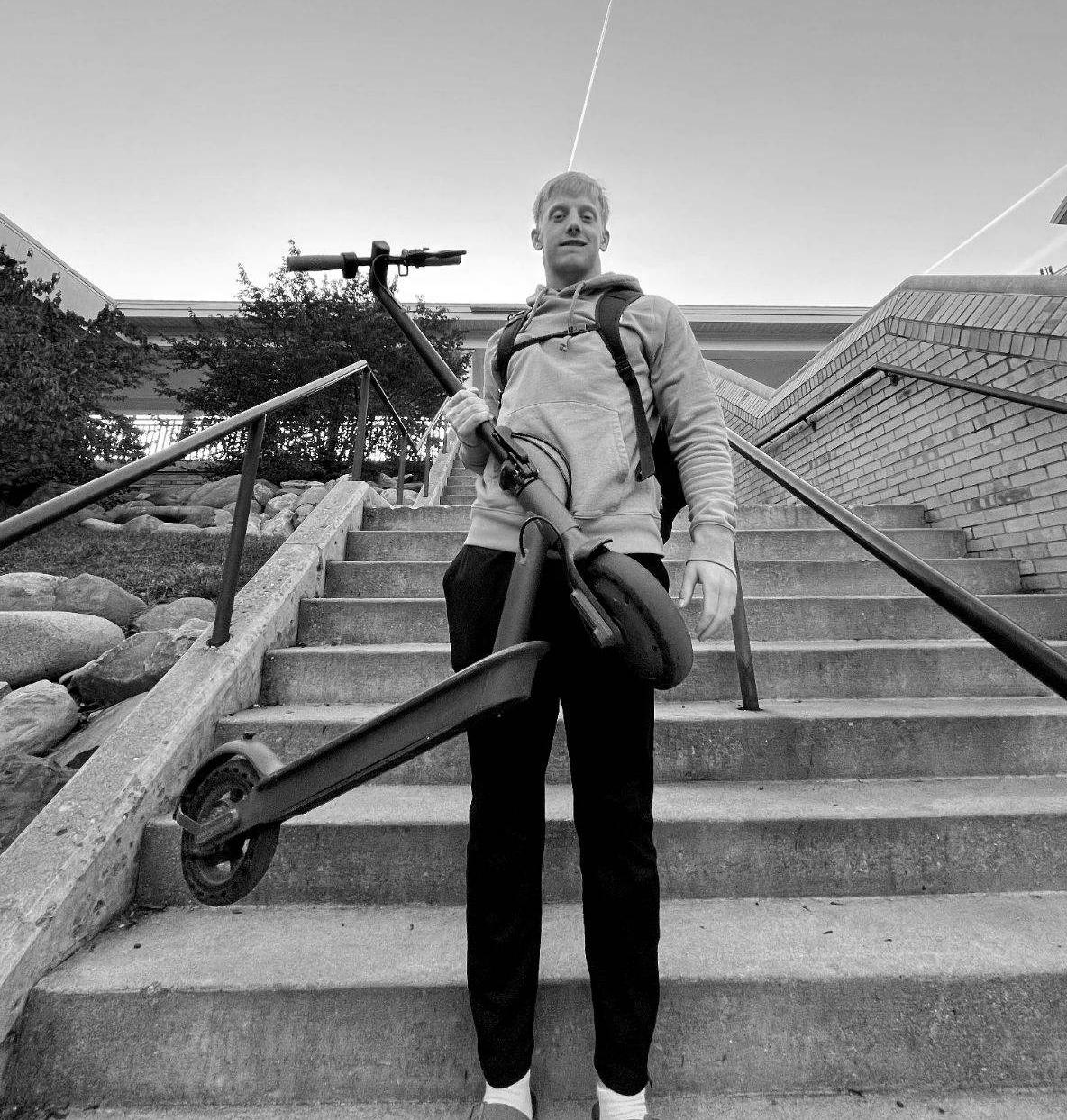
and quicker to get from place to place.” They
Shea currently ranks third in all of NCAA Division II for all-purpose yards, and saving energy may seem the most obvious advantage of scootering over walking, especially for athletes. But Shea said that is not why he rides.
“You could say it saves my legs, but I’m not really worried about that,” Shea said.
But football players aren’t the only scooter enjoyers on campus. Sophomore Nathan Furness, another Simpsonite, said zipping to class is an overdue modern innovation for a traditional campus.
“In an age where we have everything at our fingertips and put negative effort into many of our daily tasks, it’s perfectly reasonable to glide your way around campus and not have to take a single step,” Furness said. “I think they’re a great addition to campus.”
Not all Hillsdale students support the emergence of this new transportation method. Sophomore tennis player Ane Dannhauser said the riders disturb the peace of campus and keep pedestrians “on the lookout, otherwise they might run you over.”
“It is also ironic that most of them are football players, who are supposed to be athletes,” Dannhauser said. “I am sure that a 10-minute walk won’t end up killing them.” Shea said he has heard that some people oppose the scooters, but he has not had any direct complaints.
“It’s a shared sidewalk,” Shea said. “We’re allowed to go on it. Also, people ride bikes on sidewalks, and we’re not flying past people. We’re slowing down and going around you safely.”
By Caroline Kurt Opinions Editor
Alpha Tau Omega member Gerald “Spike” Hennessy saved Hillsdale College in the 1950s by paying its expenses, according to an upcoming student documentary. Thanks to his efforts, the college was able to survive without turning to government assistance.
Today, the fraternity he was part of continues philanthropic efforts.
Senior Christopher Chavey, ATO’s current philanthropy chair, coordinates volunteer opportunities and organizes fundraising events. According to Chavey, ATO partners with Crossroads Farm, a cooperative rural youth ministry in Reading. ATO regularly sends men to work at the farm.
“Last semester, we painted
a fence, we mulched, we do whatever needs to be done,” Chavey said. “All of our philanthropy profits go towards them.”
Chavey said his mission is to reach as many people as possible.
“Community involvement is a big thing for us,” Chavey said.
According to Chavey, many ATO brothers volunteer through A Few Good Men, helping elderly, disabled, and low-income households with lawn care, repair work, and other projects.
Junior Augustine Matheson started leading a volunteer crew with Chavey this year.
“We have anywhere from three to five people join us each week,” Matheson said. “We’ve gone out every Monday and done a bunch of yard work. It’s been great so far.”
Senior Samuel Aylor said the role models he saw among the older ATOs drew him to the fraternity, more so than the stereotypical Greek culture.
“My entire rush cycle, I didn’t drink,” Aylor said. “I didn’t do it for the dudes or the parties. It was specifically for those individual relationships and the standards I saw them hold themselves to.”
Aylor, who served as ATO’s philanthropy chair last year, said he tried to emphasize the value of volunteerism as part of a well-rounded Christian life.
“It’s great to go to church,” Aylor said. “Cool, that’s great to see you at Mass, but let’s utilize another virtue of giving time, of service.”
That doesn’t mean it’s always convenient, Aylor said.
“Philanthropy is not re -
By Ezra Blackwell Collegian Freelancer
Tyler, The Creator’s “Chromakopia” remains consistent in his older albums’ style while also presenting new narrative elements.
Tyler Okonma presents the “Chromakopian” aesthetic: a sensation of self-expression referenced in the nomenclature of the album title. The first half of the title, “Chroma-,” comes from the Greek root “chromo” which means color. The second half, “-kopia,” derives from the Latin “cōpia” which is translated “abundance.” The album’s title alone presents Okonma’s personality and modern hiphops fluctuation. A dichotomy, however, emerges simultaneously with the culmination of some musical themes sparked in previous records “Flower Boy,” “Igor,” and “Call Me If You Get Lost,” and its thematic alter ego revealed in “Chromakopia.”
The record’s third track, “Noid,” exemplifies this aural culmination of previous records. Okonma paints a picture with the dynamic range of sounds offered by his own discography. He combines the soft vocal interludes of “Call Me If You Get Lost,” the synthesized lyrical lines of “Igor,” and the arpeggiated, colorful pads attributed to “Flower Boy.”
“Tomorrow,” the 12th track on the album reawakens the melodic motifs and sonic peaks-and-valleys of “Igor” tracks such as “Are We Still Friends?” The noticeable addi-
tion, however, lies in the linear, monophonic string melodies, a nostalgic nod to Okonma’s “Flower Boy.”
As a whole, the musical fruit of “Chromakopia” falls closest to the blossoming tree of Okonma’s egocentric, boisterous “mixtape,” “Call Me If You Get Lost.” Amid ceaseless callbacks to
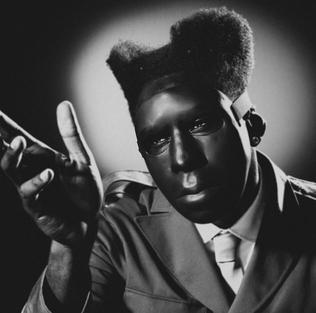
past records, “Chromakopia” occasionally reveals distinctly new sounds. Marking the halfway point of the album, “I Killed You” demonstrates eclectic orchestration consisting of Spanish guitars, tribal rhythms, and burly brass sirens. The eighth track, “Sticky,” summons Sexyy Red and company for an effect akin to other posse-prominent tracks such as Big Sean’s “Friday Night Cypher,” or Eminem and D12’s “When the Music Stops.” Each featured verse builds on the last, increasing in vigor and accompanied by raw, brass-heavy accompaniment.
Okonma’s own performance on “Sticky” shares similarities with his recent collaborations with Maxo Kream, a robust, un-
abashed declaration of affluent charisma. The characteristically “Chromakopian crunch” of the brass returns in “I Thought I Was Dead,” which overshadows its similarities with “Call Me If You Get Lost”-era “Juggernaut” with a fierceness that embodies the “Chromakopian” aesthetic.
Despite the instrumentation’s heavy reliance on past records, Okonma’s personal development also emerges. The narrative of “Chromakopia” carries an angst typical of a mid-life crisis. Okonma turns to young-adult topics concerning romantic commitment, identity, parenthood, and the inevitability of death. Lyrics like “The thought of children, it brings me stress / Because time is changing” stated on the track “Tomorrow,” reveal Okonma’s uncertainty regarding adult pressures. He continues to question his identity on the track, “Like Him,” comparing his character to that of his absent father, stating, “Do I look like him? / How could I miss something I never had?”
Okonma finds his answers in the same place he finds his creativity, Hawthorne, California: home. “I Hope You Find Your Way Home” — the album’s closer, expresses Okonma’s value of his roots, “Hawthorne is where him [Okonma] from / Back in Chromakopia / The light comes from within.” Okonma clings to home as a bulwark against the future’s fickleness, trusting that his beginnings will spark his future nuance.
quired, but you get forced to do it,” Aylor said. “Scheduling with Crossroads to come help them always comes at the worst times. It’ll be like the night after a formal.”
Work at Crossroads starts at 8 a.m., no matter what.
“You’ll get maybe 20 guys to go through the house,” Aylor said. “Those 20 guys are gonna go find everyone else who didn’t get up and wake them up.”
According to Aylor, hangovers don’t count as an excuse.
“Are you hungover? Can you think straight?” Aylor said. “Well go move this piece of wood. But that’s where the brotherhood comes in.”
Now that quad construction has compromised a previous signature event, statue golf, Aylor said ATO is looking for a new central fundraising event.
“The variety of events we’ve seen has ranged from knife sharpening to statue golf,” Aylor said. “None of them really make sense.”
Last semester, under Chavey’s leadership, the fraternity debuted Casino Night as a potential recurring signature event. ATO held the event, open to all of campus, at Hillsdale’s Elks Lodge.
“They actually have the craps table, roulette, all that stuff,” Matheson said. “So we basically just set up their room and made everything look nice.”
According to Chavey, attendees paid a $10 entry fee for a set amount of chips. The three people with the most chips at the end of the night won gift cards.
The event that raises the most money is ATO’s annual phone-a-thon.
“We all gather around in the ATO house,” Matheson said.
The brothers use their own phones to call 10 people — older ATOs, parents, and friends — for donations.
“It teaches you good phone skills,” Matheson said. “Not just calling kind of random people, but asking for money.” Next semester, Chavey said ATO plans on a second annual casino event.
“Spring will be Casino Night again,” Chavey said. “But a different version. There will be different touches.”
“We hired a jazz band,” Chavey said. “They were phenomenal. We had three blackjack tables, a craps table, and then four poker tables.”
Professors’ Picks:
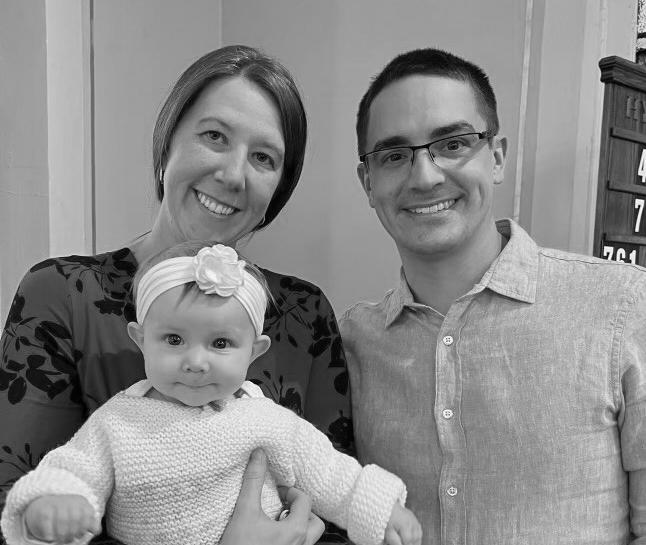
“An Immovable Feast: How I Gave Up Spirituality

They are my favorite band, and I would highly recommend them to everybody. This song brings back great memories of the big road trip my wife and I took when I was on sabbatical a few years ago — 7,000 miles and 13 national parks over the course of two months!


with
Sean and Jerry’s feelings about Will, and seeing that conflict play out over the course of the movie is engaging. It also ends on a positive/redeeming note, which I always appreciate.

By Lauren Bixler CIRCULATION MANAGER
While the campus is quiet and the morning sun rising, housekeeper Pam Petrie has already made her way to campus, starting her daily duties before most students are awake.
She extends her motherliness by making chicken noodle soup for sick college-age women and brings in cupcakes for birthdays. She even delivers rare ve-leaf clovers to residents’ rooms.
“What really struck me about Pam right away was how deeply she cares about us. She always makes it her mission to ensure
Petrie said she wouldn’t be the person she is today without her complicated past and beautiful present.
“What brought me to be so kind hearted is that I don’t want anybody to be le out or feel like they aren’t wanted,” Petrie said. “Everybody needs somebody to love them.”
Petrie grew up in Menominee, a Michigan city along the border of Wisconsin. A er an unstable childhood, Petrie met her husband soon a er high school and then followed him to Hillsdale, where he grew up. e couple has since built a life together within the Hillsdale and college community.
just start doodling and make little owers or bugs, and it exploded from there,” Petrie said.
Bill Lundberg, the recreation and tness director for Hayden Park, has befriended Petrie a er working together over the years.
“I’ve been really honored to know her,” Lundberg said. “ is is a lady that will bounce back from any hardship or any difficulty. ose are the kind of people you want to be around because they encourage you by their attitude, their work ethic, and their ability to persevere.”
When Petrie learned that Lundberg’s 96-year-old mother is in a care facility – and fond of angels
“I talk to all animals, and my niece tells me I’m a fairy princess, because my hummingbirds will do a half-pipe over my head, or come up and buzz in my face to let me know they’re there.”
we feel cared for and heard,” said sophomore and Koon resident Heather Juskiewicz.
While some see scraps, Petrie sees potential, as she refuses to let anything go to waste. Petrie attributes this vision to her “rose-colored glasses” which frame the world in a more beautiful light.
“Most people don’t pet bees. I pet bees,” Petrie said. “I talk to all animals, and my niece tells me I’m a fairy princess, because my hummingbirds will do a half-pipe over my head, or come up and buzz in my face to let me know they’re there.”
A er bouncing between homes as a child, Petrie said she never felt wanted. Now, she has made it her mission to make sure no one else around her feels the same neglect.
“We just celebrated being together for 36 years,” Petrie said. For Petrie, meeting her husband was a chance at a new life.
Petrie began working at the college in 2008 when a housekeeping job opened up, and she has remained at the college since.
As part of the care Petrie bestows on dorm residents, she o en gi s hand-cra ed wire art. Petrie uses scrap or recycled wire, sometimes gi ed by other maintenance workers, to create both small and intricate sculptures. Petrie said she avoids wasting wire at all costs and will turn even a bread twist tie into a heart for someone to enjoy.
“I worked at a place called RitzCra , sanding drywall, and while I was waiting for the mud to dry, I would pick up pieces of wire and
By Jacob Beckwith SPORTS EDITOR
In this Quick Hits, Assistant Professor of Biology Kiralyn Brakel talks about her proposal story, jiu-jitsu, and cra ing.
What’s the most unusual or surprising skill you have that most people don’t know about?
I can unicycle. I used to take 10-to-30 mile unicycle rides just for fun.
What is your favorite class to teach?
Histology. We spend a lot of time looking through microscopes, which I really love.
What is something you’ve always wanted to try but haven’t yet?
Sur ng. I think I would be good at it.
What is something about a molecular lab that most people don’t know or realize?
About 90% of your success is dependent on your ability to pipette consistently. e other 10% is magic.
If you could have any animal, real or mythical, as a pet, what would it be?
I’m actually not that interested in having pets. Too much responsibility.
What’s your go-to strategy for getting out of a creative slump?
Just do the thing. Do it badly, but do it until you get your inspiration back.
What’s the most memorable trip you’ve ever taken, and what made it so special?
My husband would be sad if I didn’t at least bring up our trip to Egypt – he proposed to me in front of the Sphinx. But the rst one that comes to mind is a trip I took with my sister to the Upper Peninsula the weekend before
I got married. We hiked 20 miles around the perimeter of Grand Island in Lake Superior in about eight hours. We took the rst ferry in and got back to the dock just in time to take the last ferry out. We did not train for that hike, but, limping to the ferry at the end of the day, we did not regret our decisions.
If you were a superhero, what would your superpower be?
Making a re at any time out of anything. It’s not the most useful in ghting crime, but it is absolutely what my power would end up being.
What’s the last book, movie, or song that made you feel deeply inspired?
Wow, “deeply inspired” is a tall order. Maybe the song “ is My Soul” by the Gray Havens. It takes you through the creation, fall, and redemption of man using the same chorus to bring out di erent themes in each verse. It reminds me that
in di erent seasons of life, you can get different important truths from the same thing, depending on how and when you hear something.
What’s a hobby or activity you used to love as a child but haven’t done in a long time?
Now that I have a child, I actually do most of my childhood activities again. But I used to do a lot of cra ing and beading as a kid, and I haven’t done that sort of project in ages.
What is your favorite thing to do or place to visit outside the classroom?
I spend a lot of time in the gym doing jiu-jitsu, but I also love watching friends and family in shows at the local theater, and jumping on our trampoline or riding bikes with my daughter.
– she constructed an intricate wire angel for Lundberg’s mother.
“She was able to create something beautiful for my mom, not knowing my mom, but knowing her through me,” Lundberg said. Petrie said she sees the world through a di erent lens because God has helped her overcome the pain in her life and redeem a broken past for a ful lling present. She said to be grateful to God for the blessings he provides in all areas of life.
“You never know what beautiful things you can nd in the strangest of places,” Petrie said.

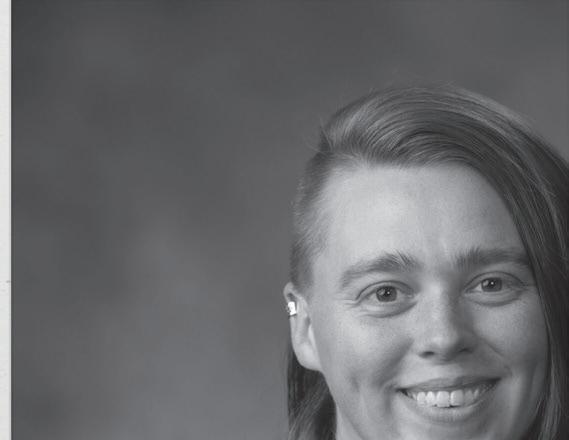



By Adriana Azarian COLLEGIAN REPORTER
Junior Hana Connelly grew up watching televised sports games and dreaming of being like Fox Sport’s sideline reporter Erin Andrews. Now, she’s the college radio station’s first sideline reporter.
Starting this year, Connelly’s job includes covering football, baseball, and men and women’s basketball home games, a role that previously didn’t exist at WRFH Radio Free Hillsdale 101.7 FM, according to the station’s General Manager Scot Bertram.
“I’ve always wanted to do sideline reporting, and coming to Hillsdale, I kind of had squashed that dream because the broadcasting department wasn’t super big,” Connelly said. “When I went home my first summer, I felt like the Lord said to me, ‘Why are you closing your own doors?’ And so I went to the radio station and talked to Mr. Bertram, and he helped me to get super involved.”
As a sideline reporter at Hillsdale, Connelly said she has enjoyed seeing close-up interactions between players and the coaches.
“It’s funny when you see a player do something wrong, and the coach will come over and get a little aggressive, they yell at them and straighten
them out. It’s kind of intimidating,” Connelly said. “To be on the field to watch specific players, see who’s hurt, know exactly what’s wrong with them, and to be involved with that perspective is super awesome.”
A native Floridian, Connelly comes from a family of Gators fans. Her father still holds the record for the most career tackles at the high school both he and Hana attended. Hana herself played volleyball and flag football in high school.
“I’ve been involved in that life for a really long time,” she said.
When Fresno State University’s play-by-play announcer Paul Loeffler contacted Bertram looking for a spotter in its opening football game against the University of Michigan, Bertram recommended Con-
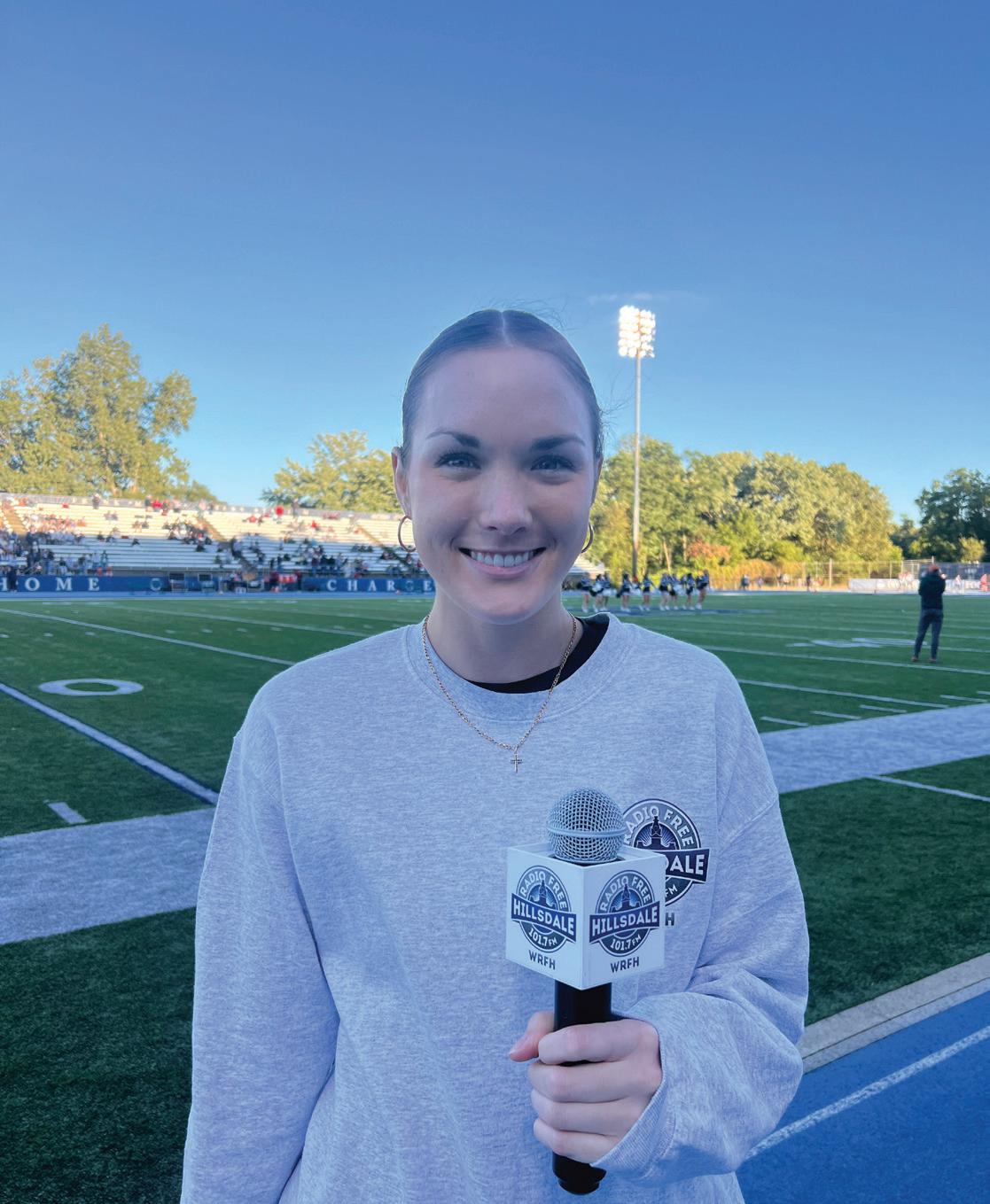
the previous national championship winner, so they had a lot of clout,” Connelly said.
“I met all of the Fresno State radio people, and a lot of them were ex-NFL players, which is really awesome.”
Bertram said such opportunities to practice and hear professionals broadcasting helps students gain new ideas for improvement.
“She came away having been involved in a Division 1 football broadcast with a lot more ideas, a lot more confidence in what she was doing, and an even better understanding of how that sideline position works in the scope of a broadcast,” Bertram said.
Connelly interned last summer with Fox affiliate KNWA News in Arkansas, where she covered football for the University of Arkansas and made
“ She came away having been involved in a Division 1 football broadcast with a lot more ideas, a lot more confidence in what she was doing, and an even better understanding of how that sideline position works in the scope of a broadcast. ”
nelly as a “great fit.”
According to Connelly, she sat in the booth with Fresno State’s announcers on Aug. 31,
using binoculars and a sheet with the players’ names and numbers to identify the players making tackles.
“It was their opening game in the Big House and there were 107,000 people there. And obviously, Michigan is
reels and packages for the station.
“Hana has really taken every opportunity presented to her to
improve herself and find more information about the industry and how it works,” Bertram said. “She has confidence in herself, which bleeds over into the broadcasting aspects, and that’s a key attribute. People like to hear someone who is strong and confident out here.”
As WRFH’s sports director, Connelly organizes home game broadcasts and hosts the radio feature “Charger Rundown” alongside junior Evan Mick, the radio station’s assistant sports director.
“It’s a lot of fun working with Hana,” Mick said. “When she’s interviewing somebody, she’s having a conversation. She’s not just asking them the questions that she has on her list. She’s still making up questions as you go along, because she wants to actually get to know about you.”
Connelly said she intends to pursue a career in broadcasting after college, whether it involves sports or otherwise, and that her experience sideline reporting has been “a really good start.”
“It’s cool to start something at college that has never been there before,” Connelly said, “I had the opportunity to start something really awesome, that I hope will stay when I leave, for people that do love sports and want to sideline report or go into broadcasting of some sort.”
Finding the ‘unspeakable magic’ in baking
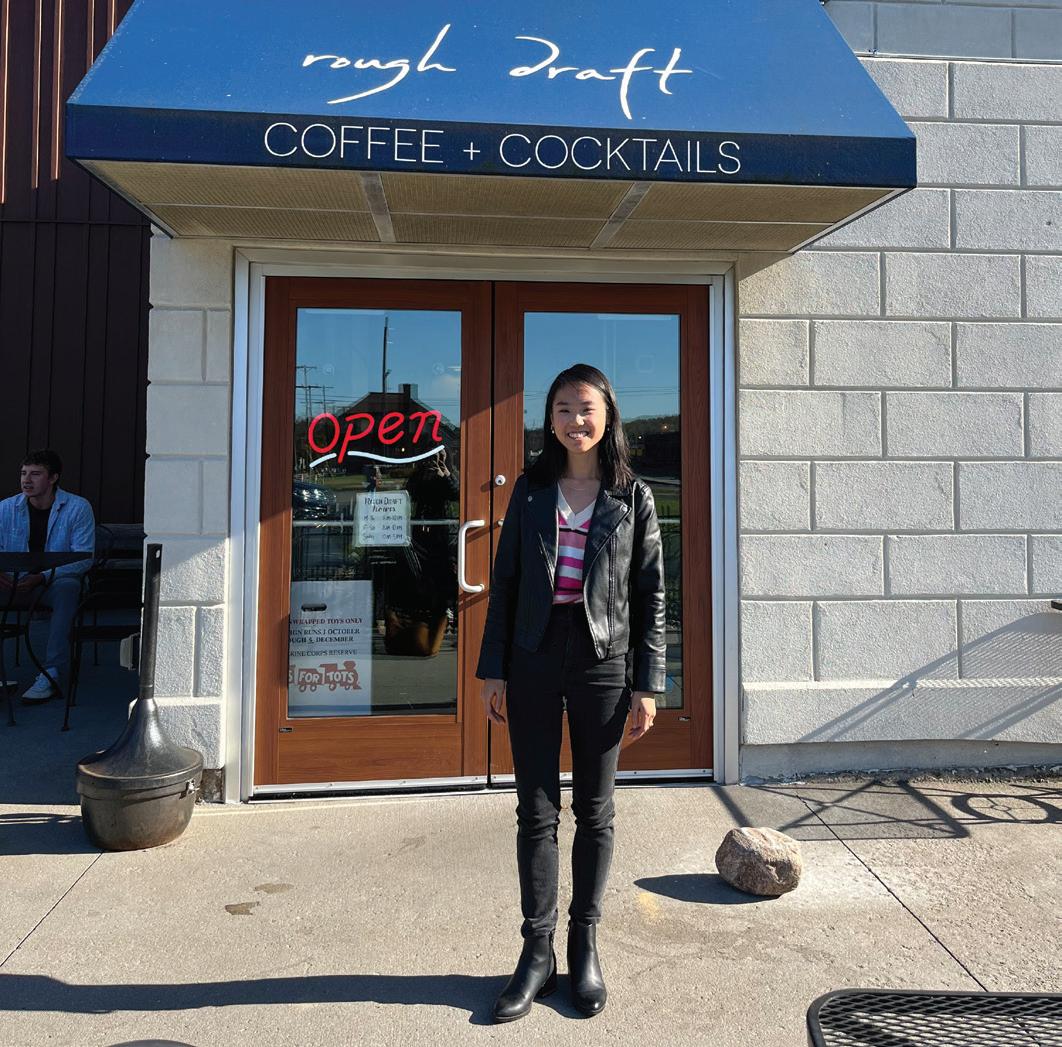

By Ally Hall DESIGN EDITOR
Step aside Socrates and Aristotle fans, there’s a new philosopher on the Hillsdale scene: senior Emma De Nooy.
“I actually thought about dropping out at the beginning of this semester to go cook for somebody,” De Nooy said. “I didn’t because I’m a senior, so I might as well finish.”
De Nooy is completing her major in rhetoric and public address with a minor in dance, but her real passions lie in the kitchen.
Her husband, Micah Miller, thinks her approach to cooking, baking, and all things food essentially makes her a philosopher. Instead of debating people in a town square, De Nooy brings homemade goods to classes, experiments with ingredients she doesn’t even like, and now works as a baker for Rough Draft.
“She does what a philosopher should, which is love something dearly just for its own sake,” De Nooy’s husband Micah Miller said. “She very sincerely adores it.”
But this is a relatively newfound passion for De Nooy. She didn’t grow up helping out in the kitchen, mostly because she was one of seven children.
“My mom just didn’t have the time, so I would watch videos and read cookbooks,” De Nooy
said. “I had an internship here one summer, and I had to start cooking for myself. I started cooking and realized how much I had picked up on from those years.”
What began as a necessity soon evolved into a core part of her identity as she began experimenting with all kinds of recipes for various events.
“Across the time we’ve been together, which is now about two and a half years, it’s become evident that food is a factor of identity for Emma,” Miller said. “A lot of who she is is centered on it, even though it started off as a hobby.”
De Nooy loves sharing her baking so much she even baked for her own wedding last summer: brown butter Earl Grey shortbread cookies topped with edible flowers.
“When I was interviewing for Rough Draft, I said in my letter that I had no professional experience,” De Nooy said. “But I baked a bunch of these really fancy cookies for my wedding, and I thought that was a testament to my skill. I thought my cookies were good enough for my own wedding, so they’re probably pretty good.”
Marty Hubbard, owner of Rough Draft, applauds De Nooy’s baking abilities.
“Emma has really brought a fresh perspective to our menu,” Hubbard said. “Her creativity in the kitchen is remarkable.”
Though more people are now learning about her skill through the goods at Rough Draft, she’s best known for her scones. Every year for the Cravats and Bluestockings club — a group that celebrates the Regency period — De Nooy makes more than 150 scones for the Regency Ball celebration. When people started asking for her recipe and complimenting her work, De Nooy realized she had struck scone gold.
“I’ll get an idea, like recently I was in the middle of class and I thought ‘I should make a maple bacon scone,’ and if I’ve thought of this, I know probably 10 other people have thought about it,” De Nooy said. “I’ll look up as many recipes as I can for the same idea, and then I will pick aspects from each I think will work. That’s what I did with my scones, I tweaked them until I had my own recipe.”
Students who pass through Kendall Hall at any point during the later half of the week might stumble into De Nooy as she grips a tupperware container full of treats to share with her honors thesis class.
“I think it adds a certain amount of camaraderie to our meetings,” said senior Hannah Pautz, a member of De Nooy’s honors thesis class. “That probably would have grown regardless since there are so few of us. However, adding a treat at the beginning as an ice breaker definitely sped up the process.
It starts all of us out in such a good mood, it sucks out some of the nerves of the impending peer review.”
De Nooy also spends time learning recipes and styles of cooking she doesn’t even like.
“I made chicken schnitzel for my husband the other day, and I hated it,” De Nooy said. “But it was a new recipe that utilizes a new technique I’ve never tried before. I had to do it. I plan to learn everything I can about food.”
For De Nooy, post-graduation plans are up in the air, but she plans to continue exploring her wildest culinary fantasies, both in her personal and professional life. She may be only a couple years into her cooking journey, but her future holds many new opportunities – and many new baked goods – because to her, there’s no other option.
“Everyone loves food, and that’s valid,” De Nooy said. “I bake and I cook because I love food for itself. Writers, artists, people who play sports all talk about their ‘thing’ and they say that they lose themselves in it. I never got that feeling until I started working with food. With anything you truly, deeply love, there’s an unspeakable magic about it.”
Luke Waters contributed to this article.